10 The Earthly And Temporary Covenants: Distinguishing Between The Spiritual And Earthly Covenants
A Summary Of The Teaching Video
Some of the points I cover in this teaching video:
Having dedicated the last five studies to an explanation on what I believe concerning the earthly and temporary covenants, I complete my thoughts on the subject by expounding the final part of my prepared statement, namely—“In no sense should these earthly covenants be identified with a conditional covenant of grace, or, to be one and the same with the covenant of works or the covenant of redemption. The earthly covenants were designed by God to established the boundaries around which He would relate to and bestow earthly blessings upon the Jewish people as a race, in honor of the Messianic bloodline. The spiritual covenants are designed by God to establish the boundaries around which He relates to the non-elect and the elect throughout the course of history.”
Jared Smith, Muntinlupa, PH (13/01/2023)
An Outline Of The Teaching Video
The Arrangement Of The Biblical Covenants
A Summary Statement On What I Believe With Reference To The Earthly And Temporary Covenants
In No Sense Should These Earthly Covenants Be Identified With A Conditional Covenant Of Grace Or To Be One And The Same With The Covenant Of Works
The Spiritual And Perpetual Covenants Are The Boundaries Around Which The Human Race Is In Relationship TO Or WITH God
The Earthly And Temporary Covenants Are Not Based On, Nor Are They A Renewal Of, The Spiritual And Perpetual Covenants
In No Sense Should These Earthly Covenants Be Identified With The Covenant Of Redemption (Grace)
The Covenant Of Redemption (Grace) Is The Agreement Drawn Up By The TriUne Jehovah From Eternity, On Behalf Of The Elect, To Save Them From Their Sins
The Covenant Of Redemption (Grace) Is Brought To Pass In Time With The Son Of God Accomplishing His Redemptive Work And The Spirit Of God Accomplishing His Sanctifying (Regenerating) Work
The Covenant Of Redemption (Grace) Is Entirely Separate From The Covenants God Made With Noah, Abraham, Moses And David
If The Spiritual And Perpetual Covenants Are Mixed With The Earthly And Temporary Covenants, Then God’s Purpose For The Spiritual Covenants Is Undermined And His Masterplan For The Ages Is Dismantled
The Purpose For Which God Established A Covenant With Noah, Abraham, Moses And David—In Prospect Of The Coming Messiah And In Honor Of Their Biological Link To Him
Throughout The Course Of History, Unregenerate Sinners Have Been And Continue To Be In Relationship TO God Under The Authority Of The Covenant Of Works, Whereas Regenerate Sinners Have Been And Continue To Be In Relationship WITH God Under The Authority Of The Covenant Of Redemption (Grace)
A Final Word
An Automated Transcript Of The Teaching Video
I’d like to welcome you back for another study in the Word of God. As you know, we’ve been looking at the subject of the biblical covenants. And in particular, we’re going to continue our study on the earthly and temporary covenants.
The Arrangement Of The Biblical Covenants
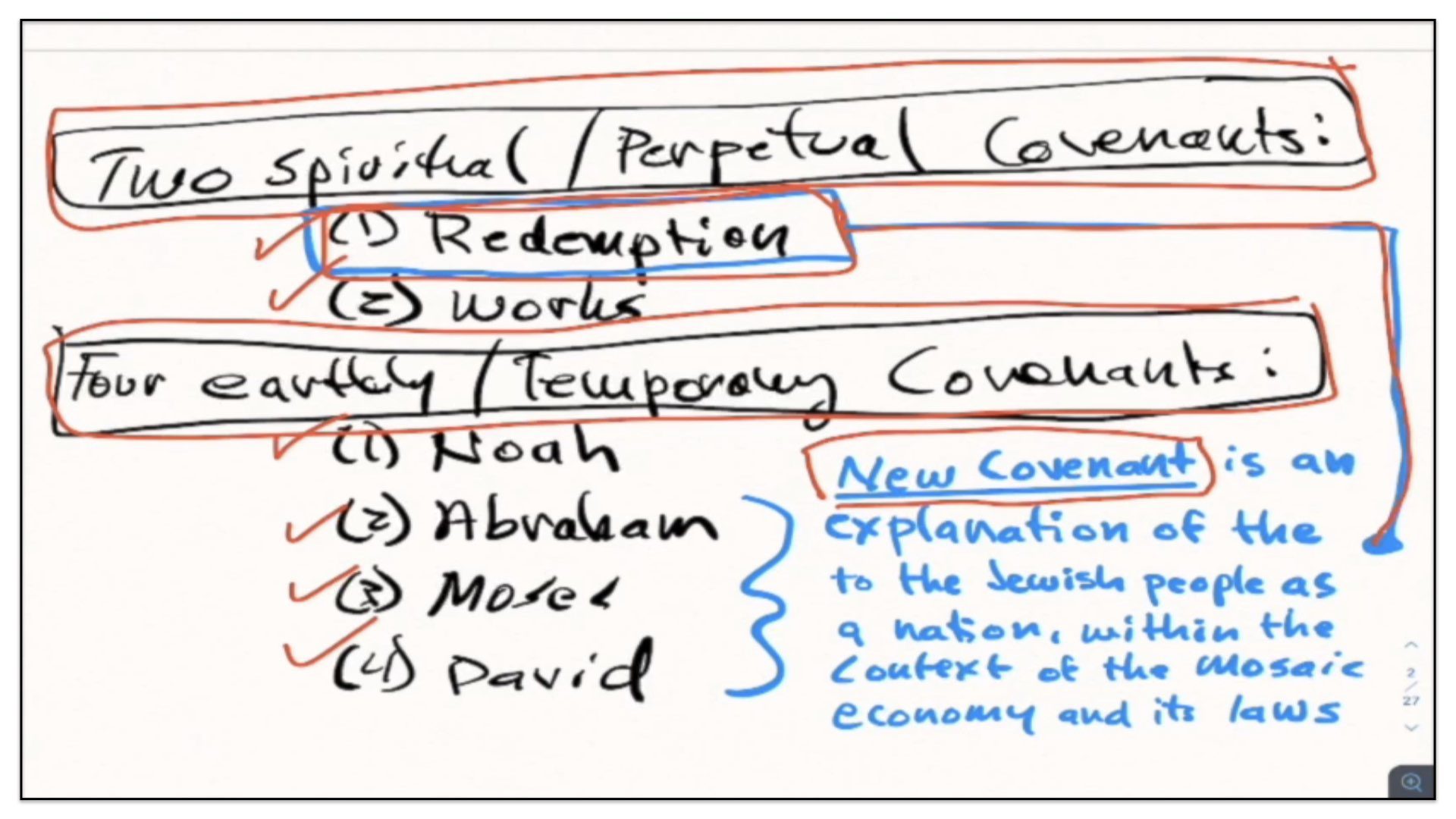
As you know, I believe the biblical covenants can be divided into two main categories. That of the two spiritual and perpetual covenants, which would be Redemption and Works. And then that of the four earthly and temporary covenants, that which God made with Noah, Abraham, Moses and David. There’s then something called the New Covenant. I suppose we could put this into a third category. The New Covenant I do not believe is an actual covenant, but rather, it’s an explanation of the Covenant of Redemption to the Jewish people as a nation who were then living under the authority of the Mosaic economy and its laws.
A Summary Statement On What I Believe With Reference To The Earthly And Temporary Covenants
Now, for the last five weeks we have been considering the four earthly and temporary covenants. And I’m pleased to inform you that today will be the final part of this, of my teachings, on these four covenants. Now in order to clarify my understanding of these covenants, I prepared a written statement, and week by week I’ve been taking you through the various parts of that statement. I’d like to read for you, by way of review, what we’ve considered in the previous weeks and then I’ll pick up where we left off and I will finish my thoughts on that written statement.
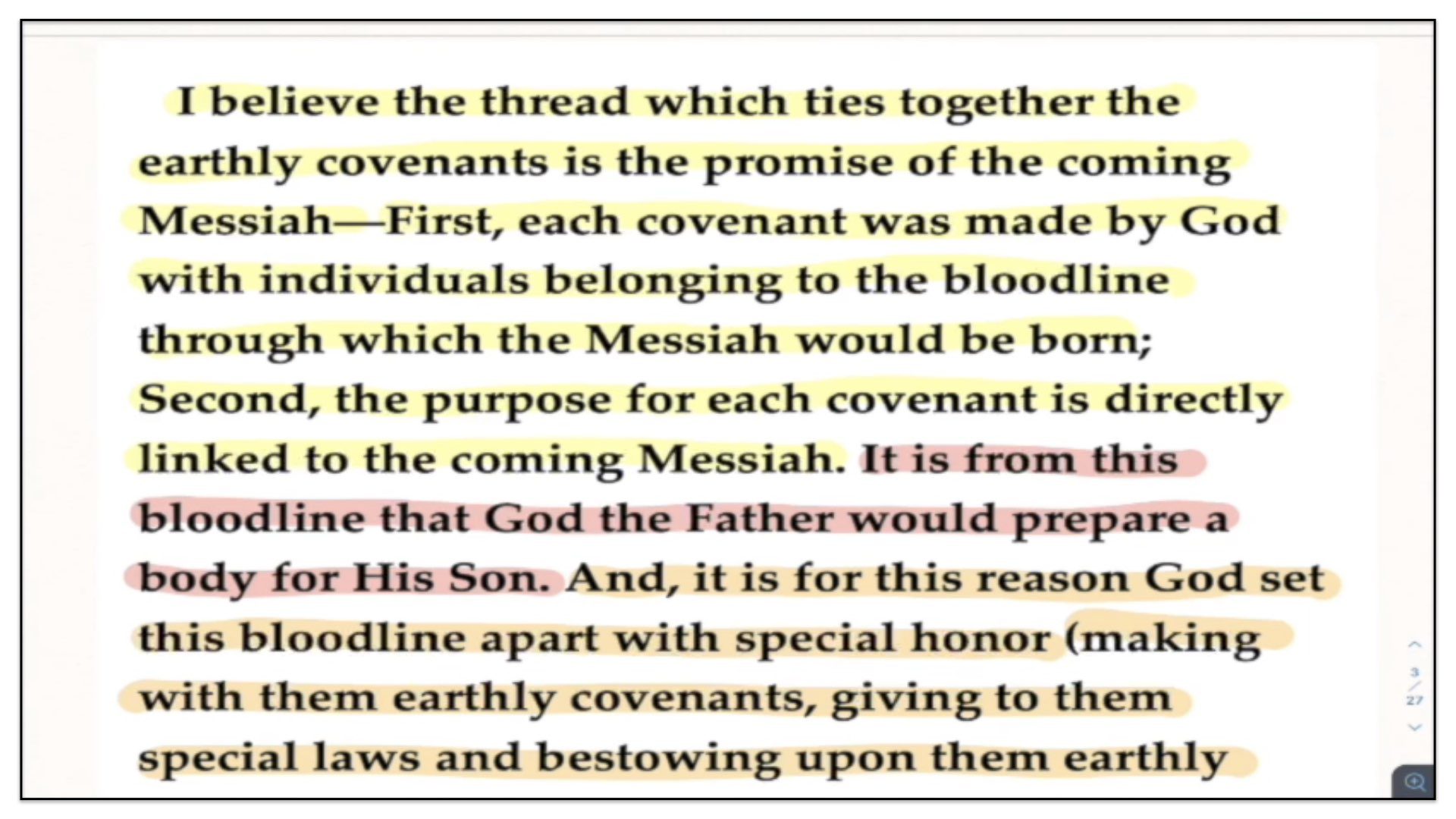
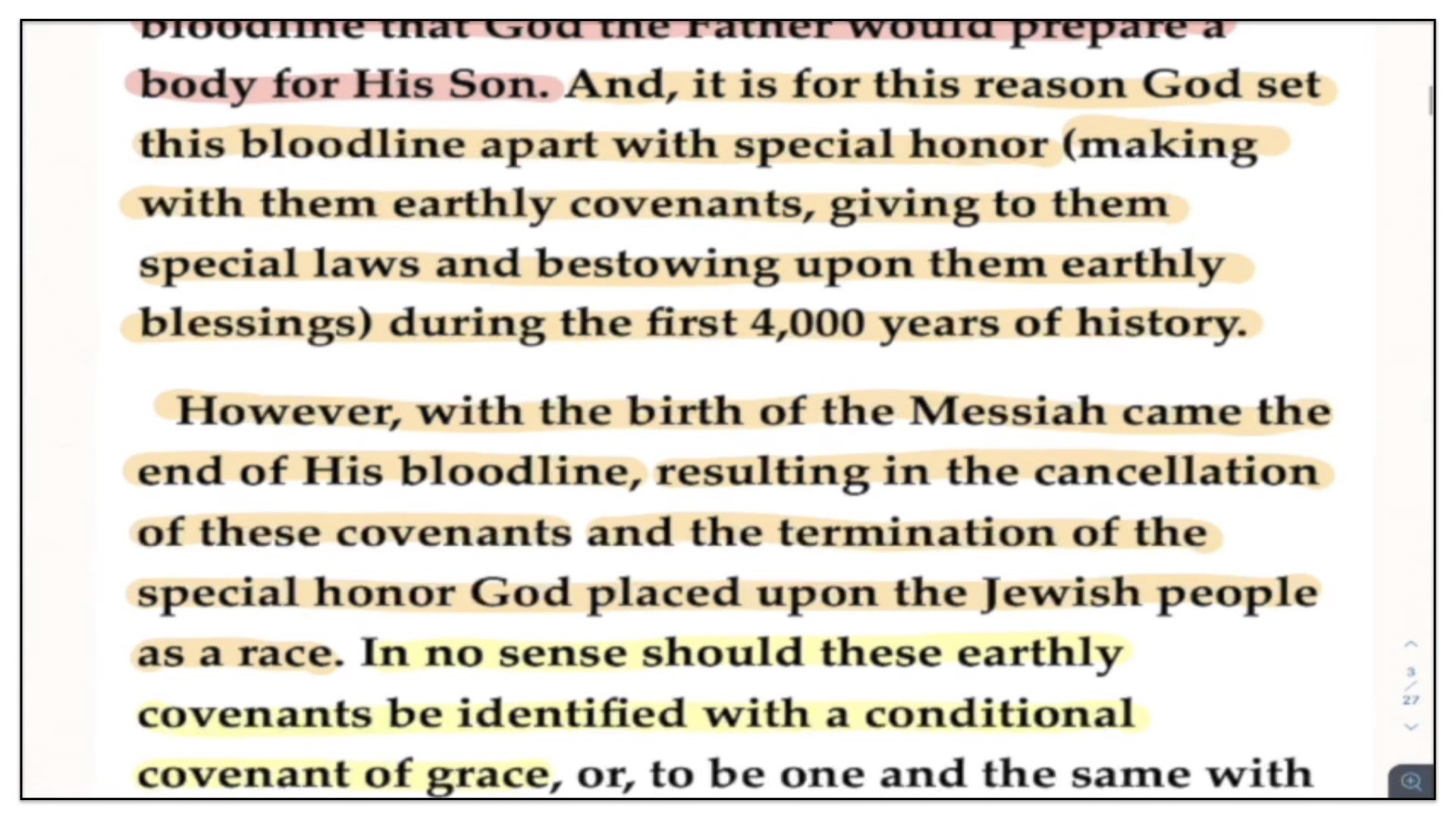
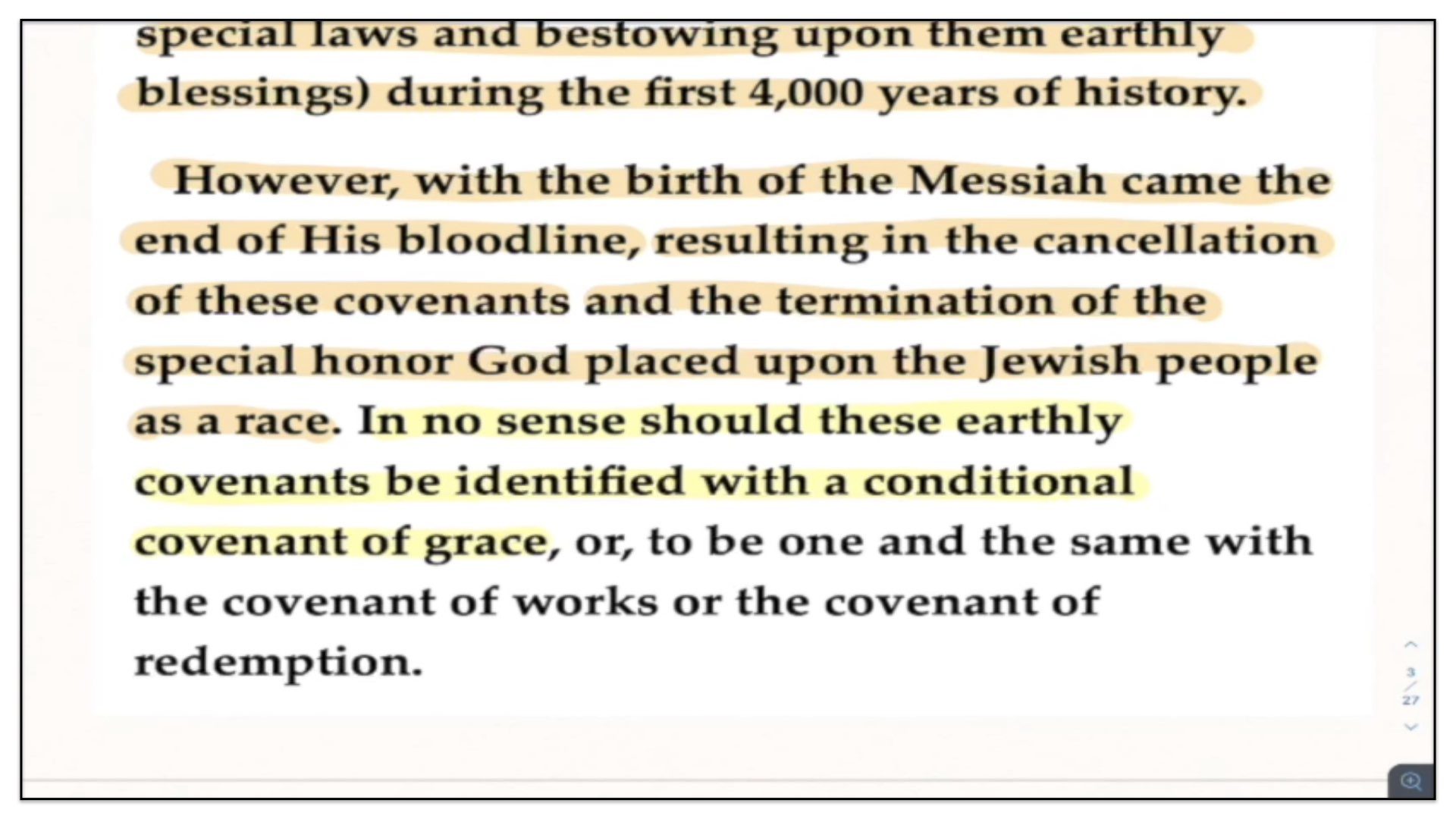
“I believe the thread which ties together the earthly covenants is the promise of the coming Messiah. First, each covenant was made by God with individuals belonging to the bloodline through which the Messiah would be born. And second, the purpose for each covenant is directly linked to the coming Messiah. It’s from this bloodline that God the Father would prepare a body for His Son. And it’s for this reason God set this bloodline apart with special honor (making with them, for instance, earthly covenants, giving to them special laws and bestowing upon them earthly blessings) all of which occurred during the first 4,000 years of history. However, with the birth of the Messiah came the end of His bloodline, resulting in the cancellation of these covenants and the termination of the special honor God placed upon the Jewish people as a race. In no sense should these earthly covenants be identified with a conditional Covenant of Grace.”
In No Sense Should These Earthly Covenants Be Identified With A Conditional Covenant Of Grace Or To Be One And The Same With The Covenant Of Works
Now, this is where we left off in our previous study. I’d like to pick up, as I’ve said, with the next statement and I will now conclude my thoughts on my understanding of these earthly and temporary covenants. Please listen:
“In no sense should these earthly covenants be identified with a conditional Covenant of Grace, or to be one and the same with the Covenant of Works.”
The Spiritual And Perpetual Covenants Are The Boundaries Around Which The Human Race Is In Relationship TO Or WITH God
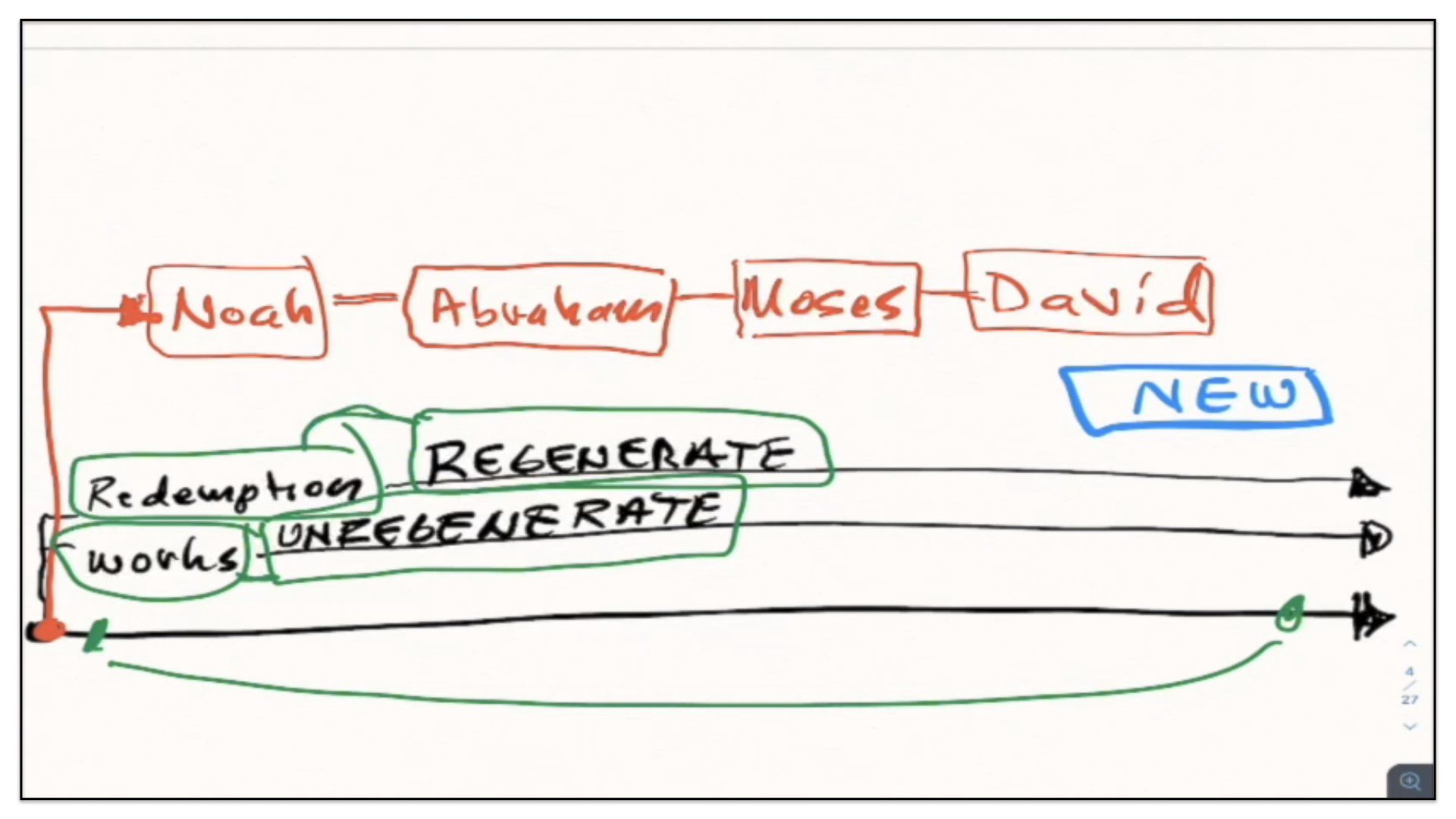
Now I’ll just pause there so I can make a comment on this point. And in order to make my thoughts clear, let me refer you to the little timeline and diagram of the spiritual and earthly covenants. You’ll notice there are two spiritual and perpetual covenants running throughout the course of history. That of Redemption—hmm, change the pen—that of Redemption and that of Works. And it’s under one or the other of these two covenants that the members of the human race have been in relationship TO or WITH God. The unregenerate sinners are under the authority of the—well, let me back up and do my notes in the proper way— the unregenerate sinners are under the authority of the Covenant of Works, whereas the regenerate sinners are under the authority of the Covenant of Grace, or the Covenant of Redemption. And you see, from Adam to Eve, all the way to the end of the world, all men and women are subject to God under one or the other of these two spiritual and perpetual covenants.
The Earthly And Temporary Covenants Are Not Based On, Nor Are They A Renewal Of, The Spiritual And Perpetual Covenants
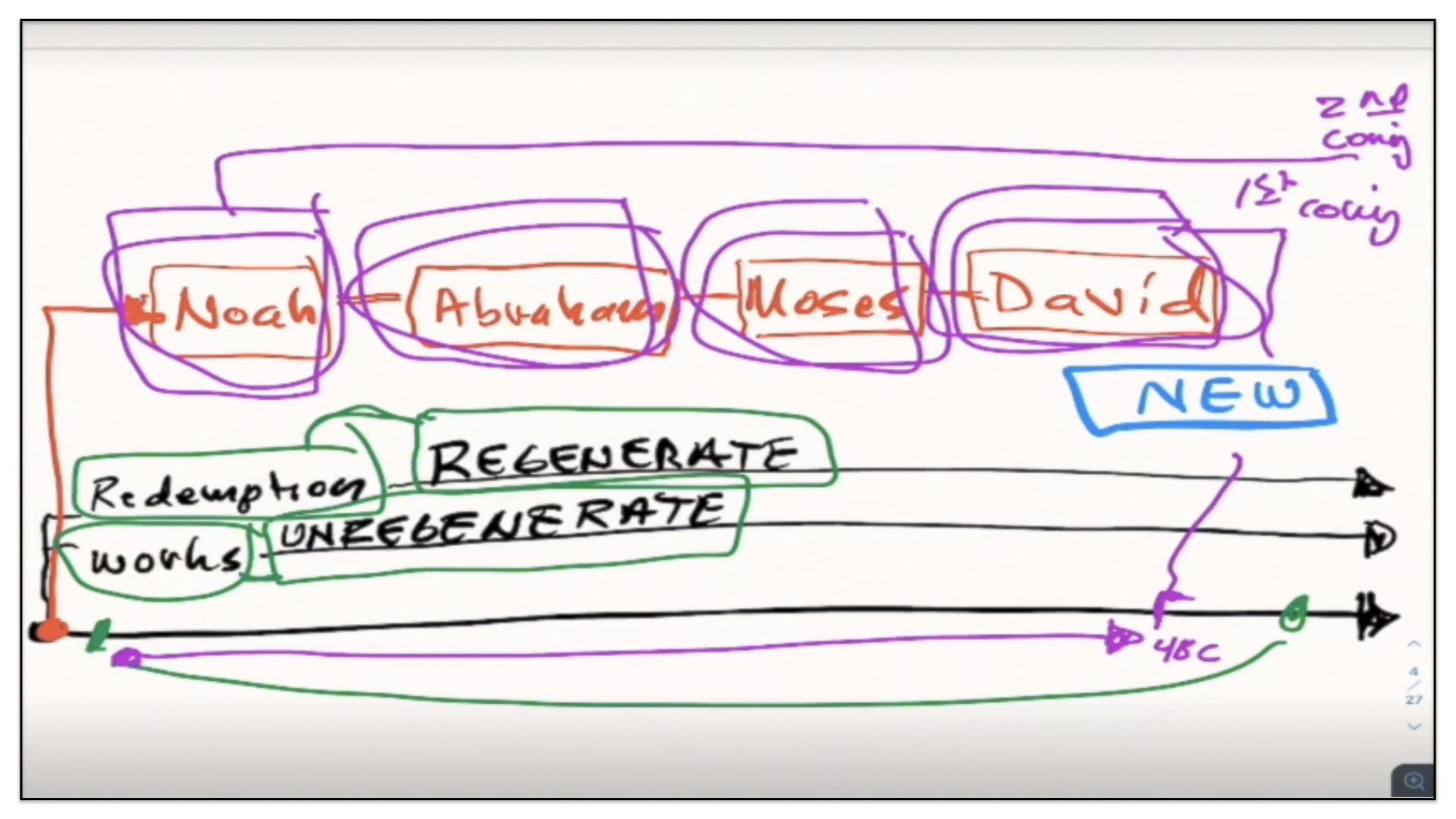
Now in addition to these two spiritual and perpetual covenants, as you see, there are also four earthly and temporary covenants. That with Noah, Abraham, Moses and David. These covenants were made by God with the family members of the Messiah, all of which pointed to the promise of the Messiah’s coming. So that promise being made in Genesis chapter 3 and then realized in 4 BC with the birth of Christ. And you see, the covenant God made with Noah, this points to the coming of the Messiah, but not to His first coming, rather, to His second coming. He’s coming again. Whereas the covenants God made with Abraham, Moses and David, these all point to the first coming of Christ. This is the central purpose for which God made those earthly covenants with these men.
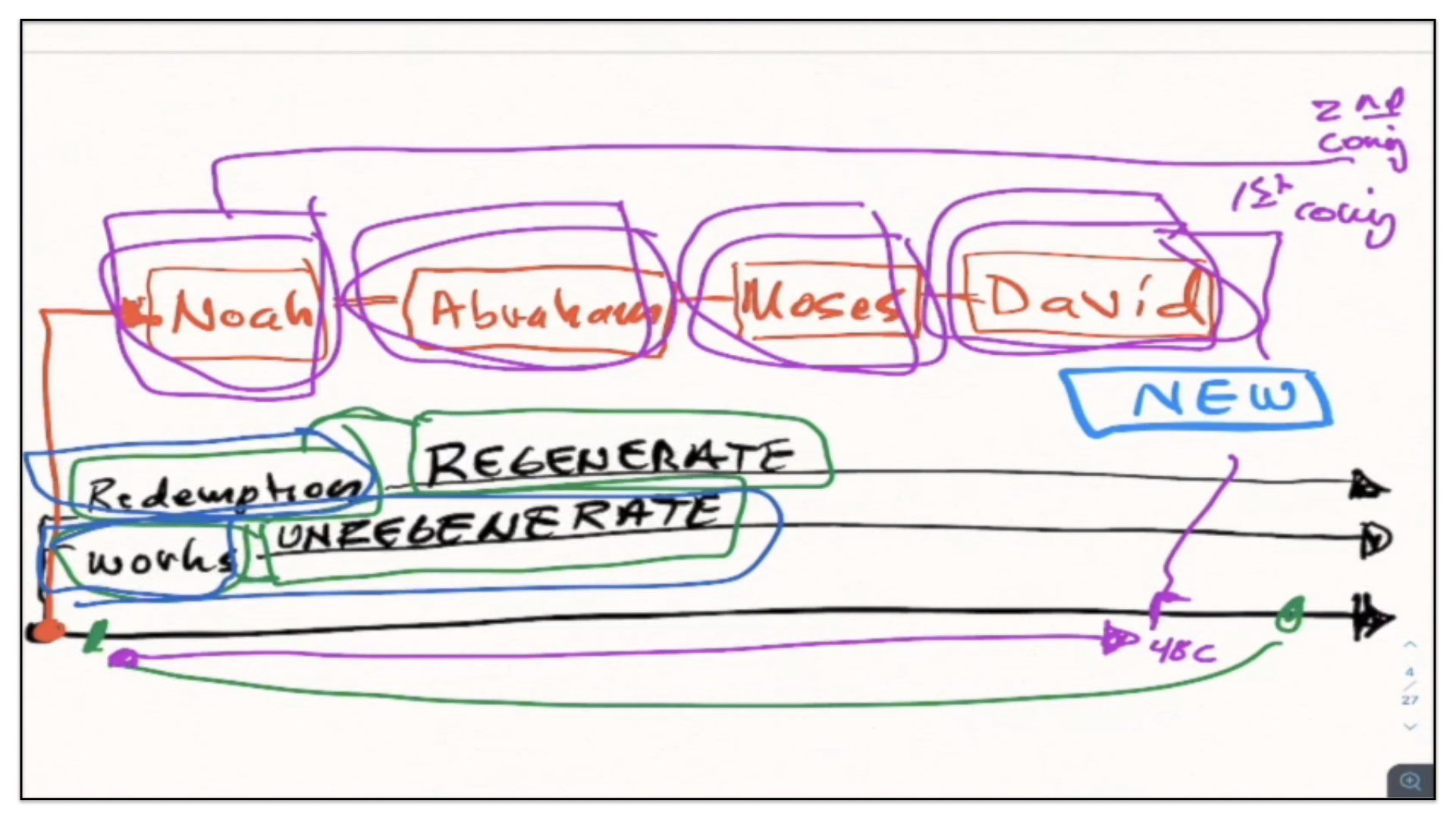
And the point I’m driving at here is that none of these earthly covenants are based upon, nor are they a renewal of, the spiritual—change the color pen again, we’ll choose blue—none of these earthly covenants are based on or are a renewal of the Covenant of Redemption or the Covenant of Works. You see, the Covenant of Works, which is what I’m now focused on, the Covenant of Works is independent and entirely separate from the covenants God made with Noah, Abraham, Moses and David. Entirely different covenants. And I emphasize this point because the Presbyterians and many Reformed Baptists believe that God incorporated the Covenant of Works with these earthly covenants God made with Abraham, Moses and David. And I don’t believe that’s true. You see, and please listen to me carefully, if we mix in any way the Covenant of Works with these earthly covenants, then we undercut the very purpose for which God established the Covenant of Works. And at the same time, we dismantle God’s masterplan for the ages. I’ll have more to say on those points when I bring you to the following part of the statement. Watch this:
In No Sense Should These Earthly Covenants Be Identified With The Covenant Of Redemption (Grace)
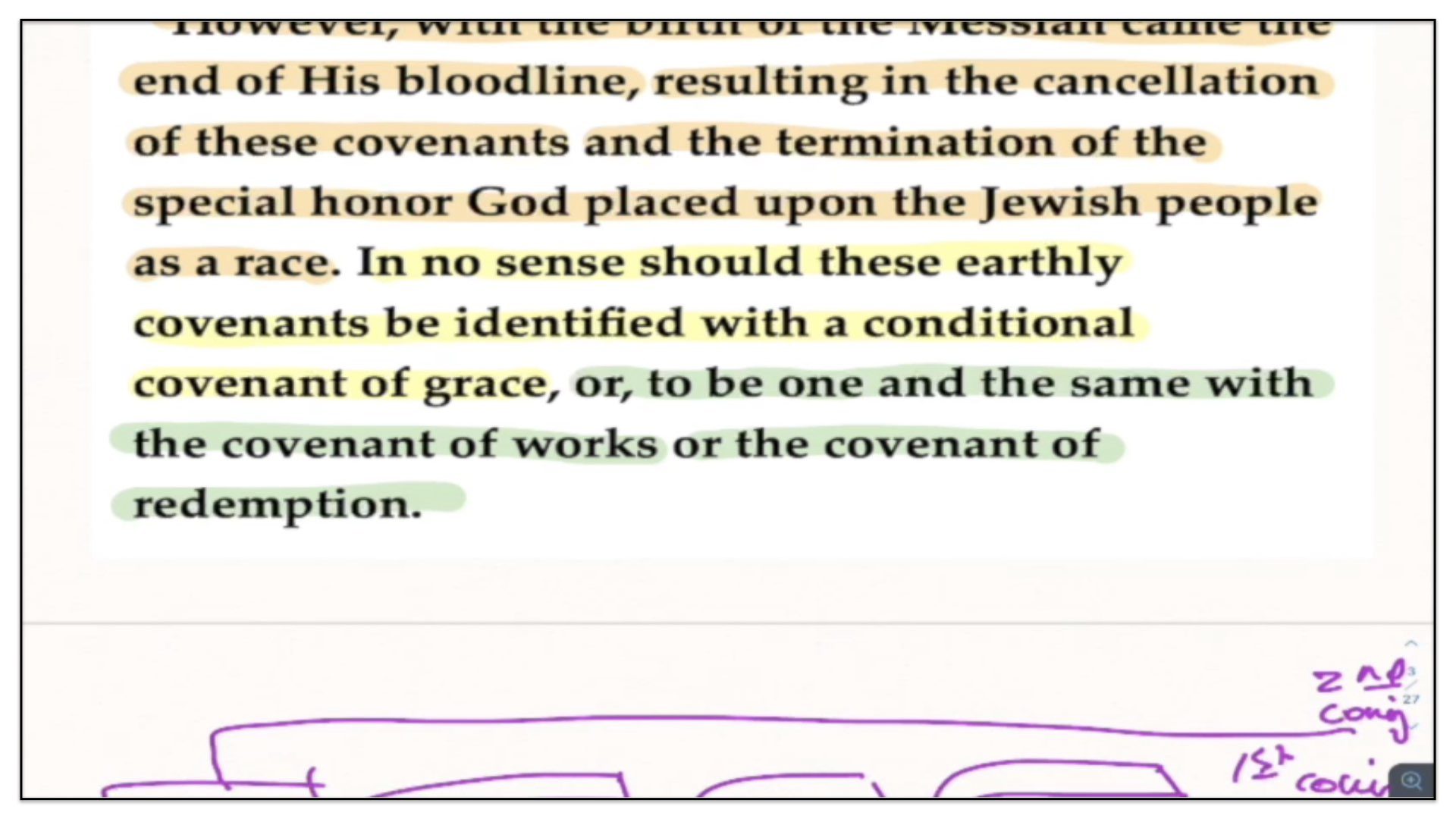
“In no sense should these earthly covenants be identified with a conditional Covenant of Grace or to be one and the same with the Covenant of Works, or one and the same with the Covenant of Redemption.”
The Covenant Of Redemption (Grace) Is The Agreement Drawn Up By The TriUne Jehovah From Eternity, On Behalf Of The Elect, To Save Them From Their Sins
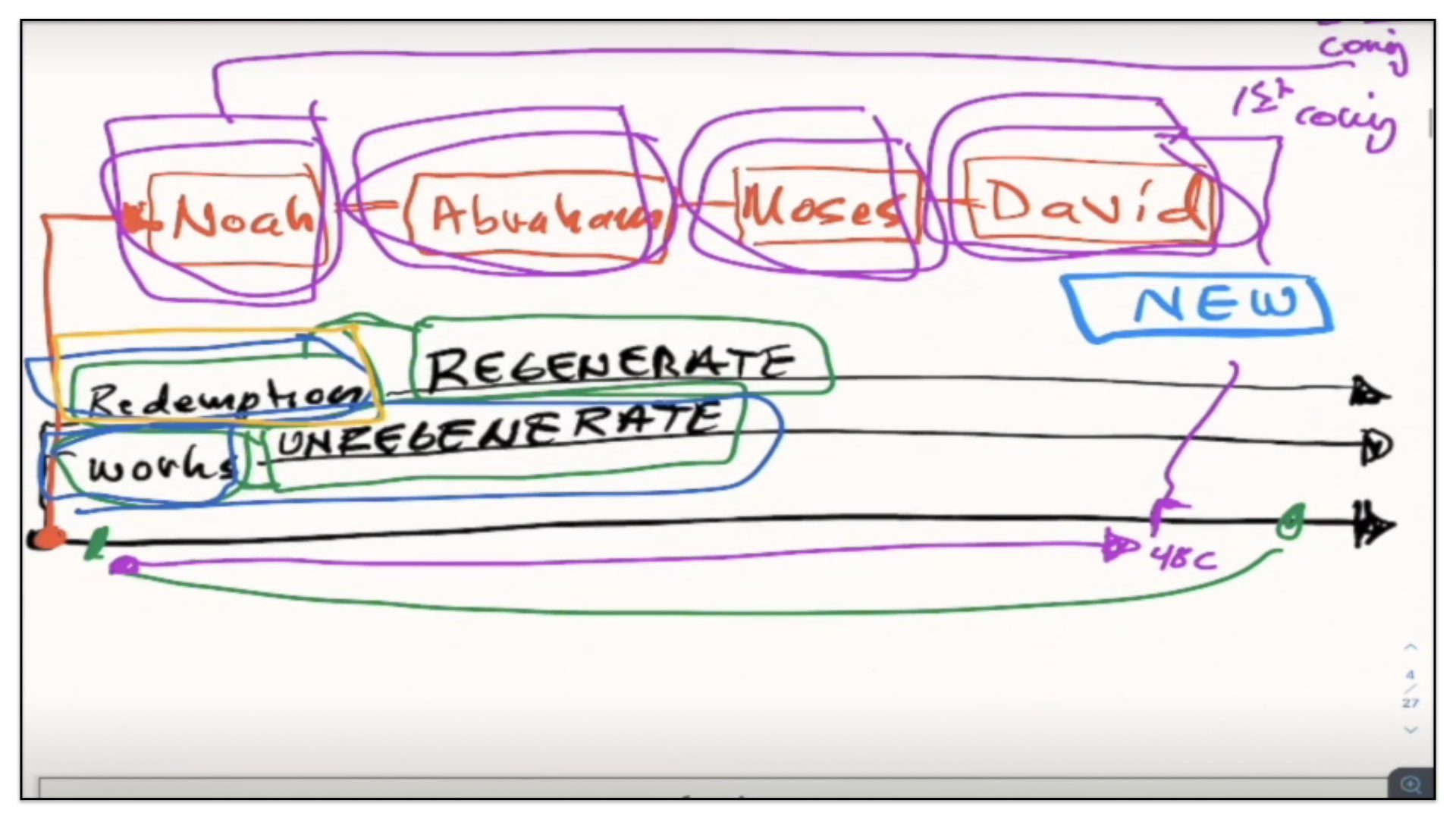
Look again at this diagram and timeline of the biblical covenants. Watch this. I’ll choose a different color. I’m running out of colors. Let’s choose orange. Watch this. The Covenant of Redemption is that agreement drawn up by the three Persons of the Godhead from eternity on behalf of His elect people to save them from their sins.
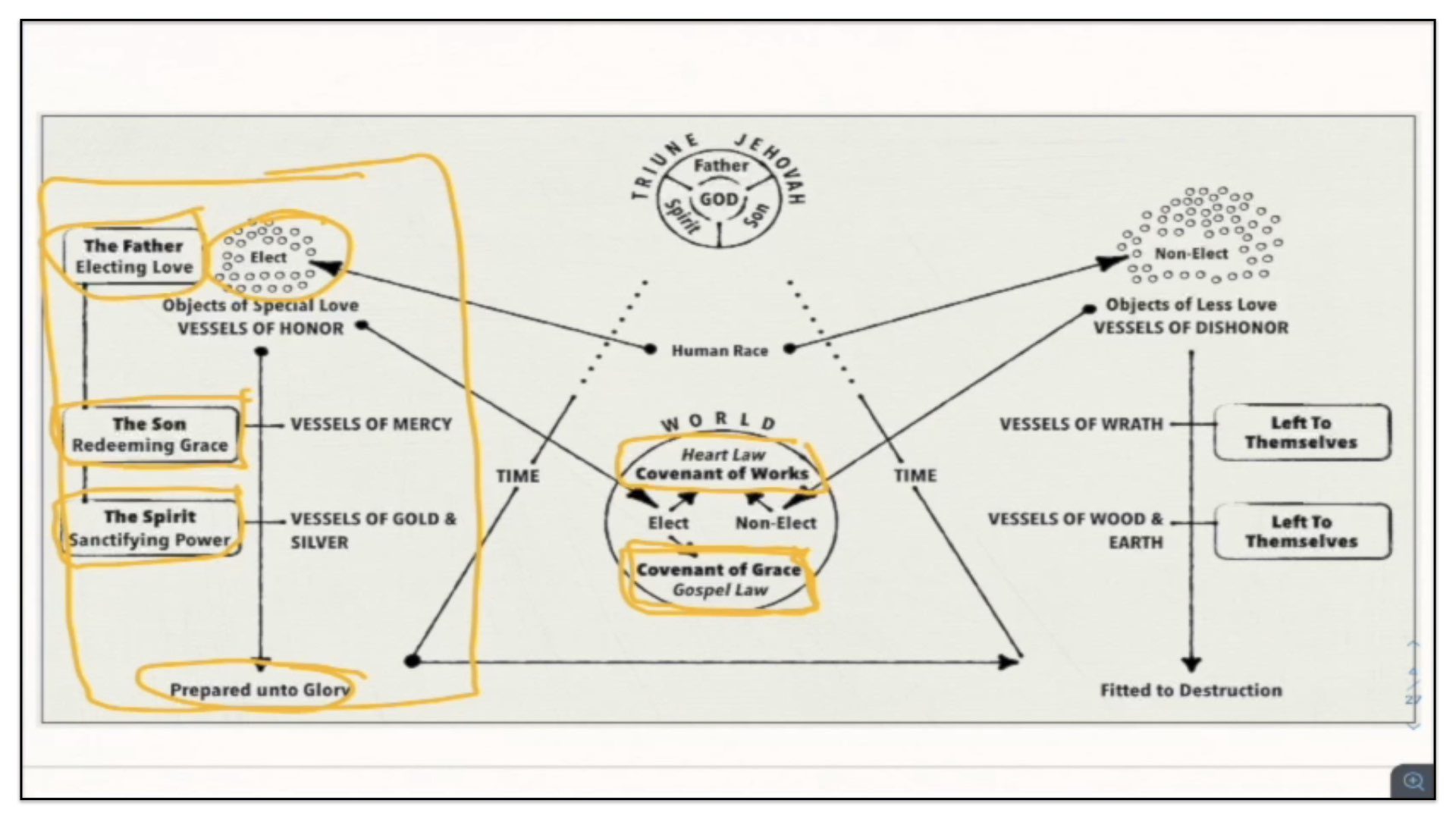
I’d like to say that again to you, but I’d like to say it this time by referring you to the Framework of Sovereign Grace, where you find highlighted in the center of this Framework the Covenant of Works and the Covenant of Grace, or the Covenant of Redemption. Remember, the Covenant of Grace, the Covenant of Redemption, are one and the same covenant. Now watch this. Here’s the point. The Covenant of Redemption, which is this here, is the agreement drawn up from eternity between the three Persons of the Godhead—the Father, His electing love; the Son, His redeeming grace; and the Holy Spirit, His sanctifying power—on behalf of His elect people in order to prepare them unto glory, or to save them from their sins.
The Covenant Of Redemption (Grace) Is Brought To Pass In Time With The Son Of God Accomplishing His Redemptive Work And The Spirit Of God Accomplishing His Sanctifying (Regenerating) Work
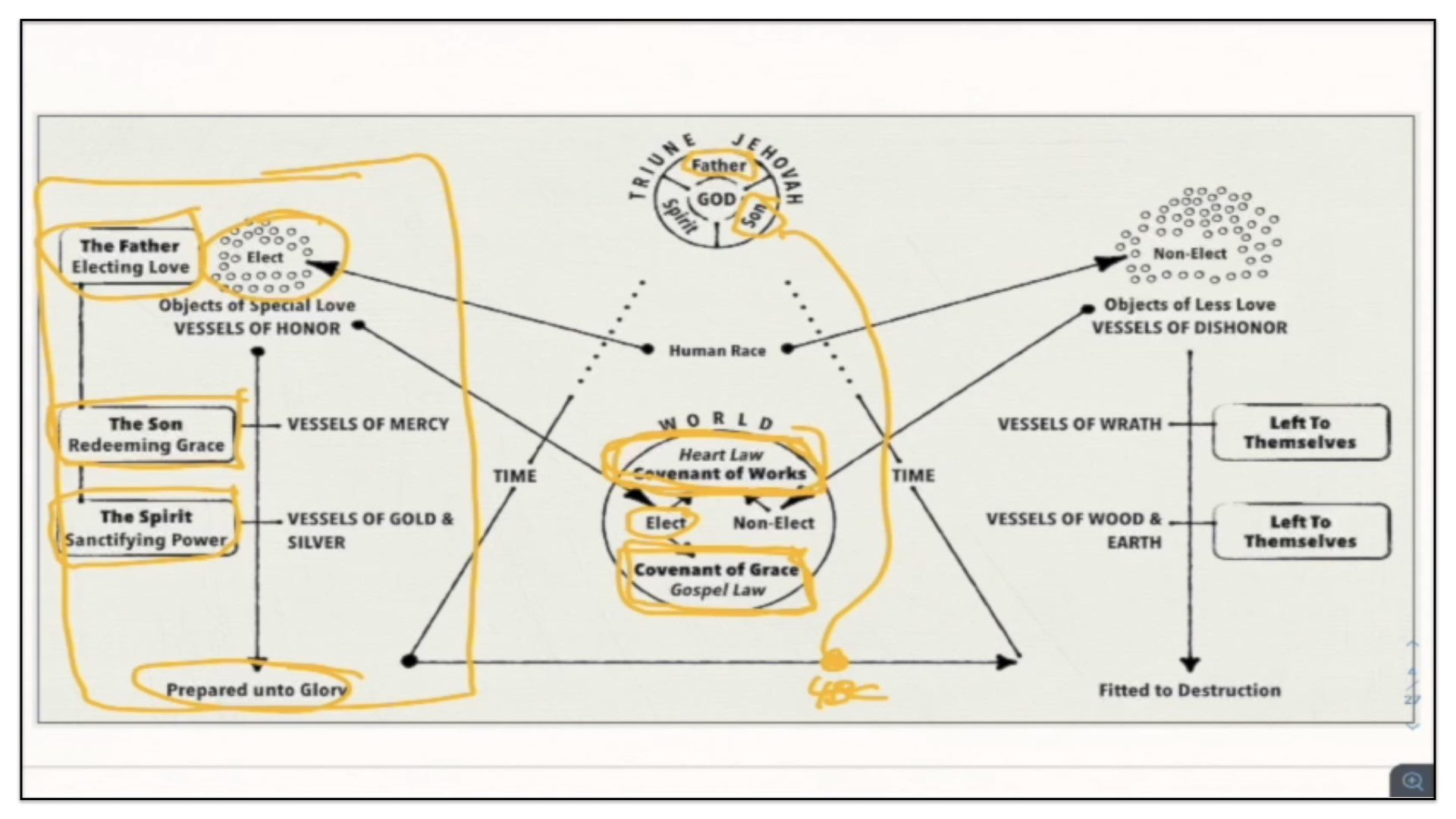
Now watch this. This covenant is brought to pass in time. This Covenant of Redemption, this Covenant of Grace, this eternal covenant is brought to pass in time. You see, when the fullness of time was come God the Father sent forth His Son in 4 BC, made of a woman, made under the Covenant of Works, in order that the Son of God in the Person of the Lord Jesus Christ might redeem the elect from their sins and deliver them from the curse and obligation of the Covenant of Works. That’s one way in which God brings to pass the Covenant of Grace in time.
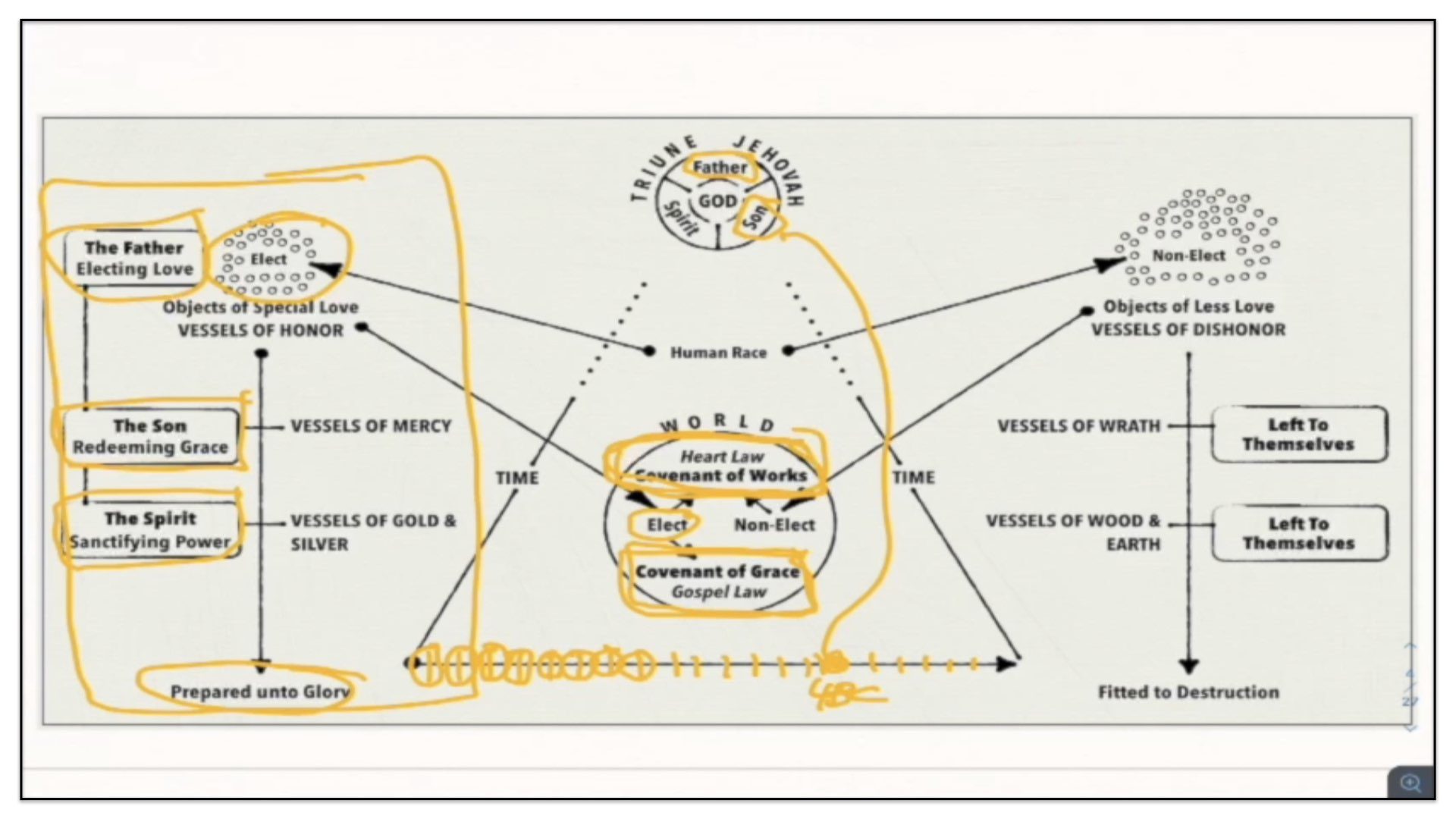
The other way that God brings to pass the Covenant of Grace in time is that throughout the course of history, at the appointed time, in the life of every elect sinner, the Holy Spirit conquers the hearts of those elect sinners, granting them the experience of a new birth. A new birth, of course, which unites the soul of the sinner with the Lord Jesus Christ, with the Son of God, by virtue of which the life of Christ flows into the sinner making him or her alive unto God. And the virtues of Christ also flow into the sinner enabling him or her to savingly believe on Christ. And you see, the Covenant of Redemption, otherwise known as the Covenant of Grace, penetrates time as God brings to pass His eternal purpose from the beginning of the world unto the end.
The Covenant Of Redemption (Grace) Is Entirely Separate From The Covenants God Made With Noah, Abraham, Moses And David
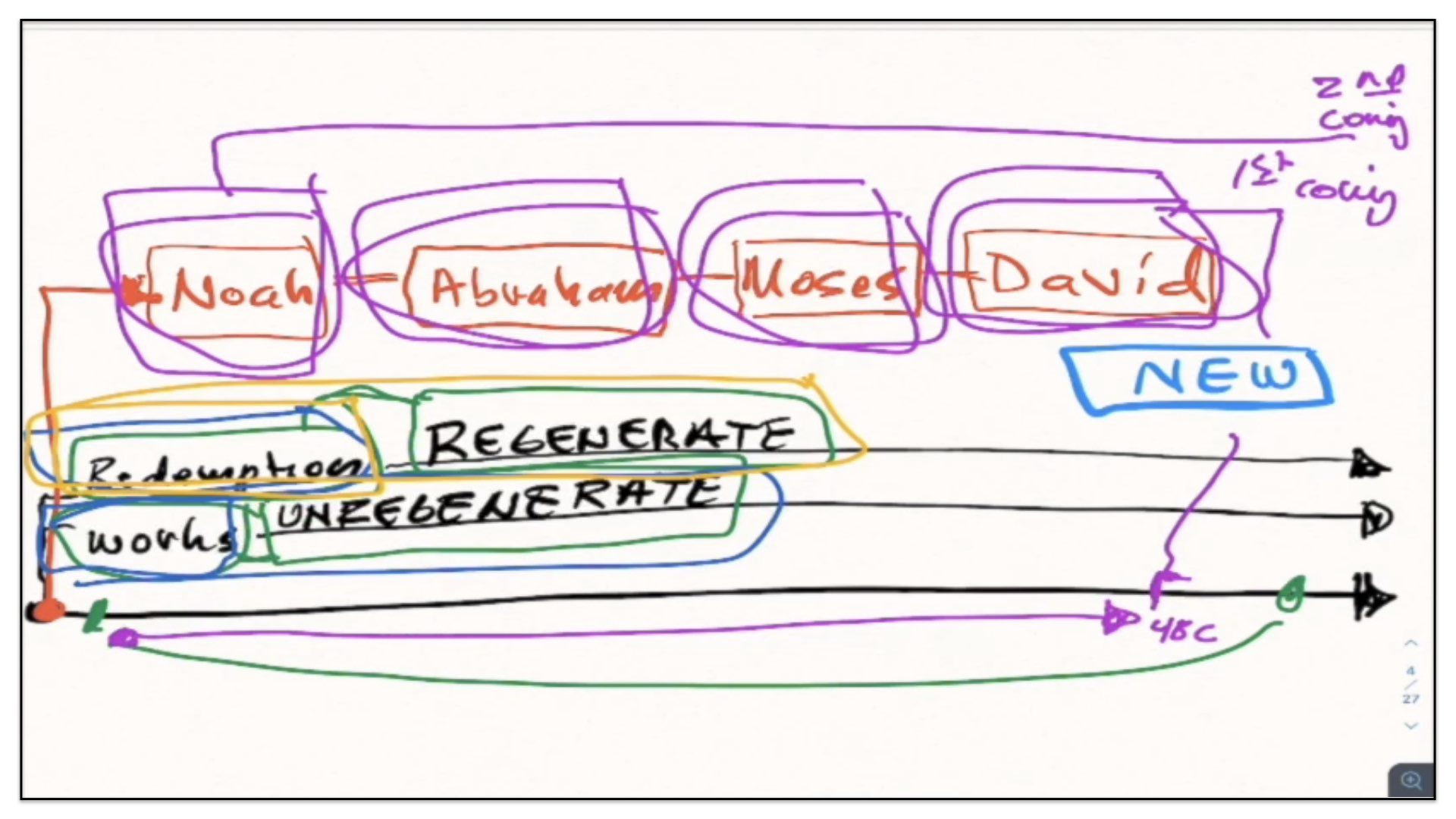
Now you see, this covenant, this Covenant of Grace or Covenant of redemption, it’s entirely separate from the covenants God made with Noah, Abraham, Moses and David.
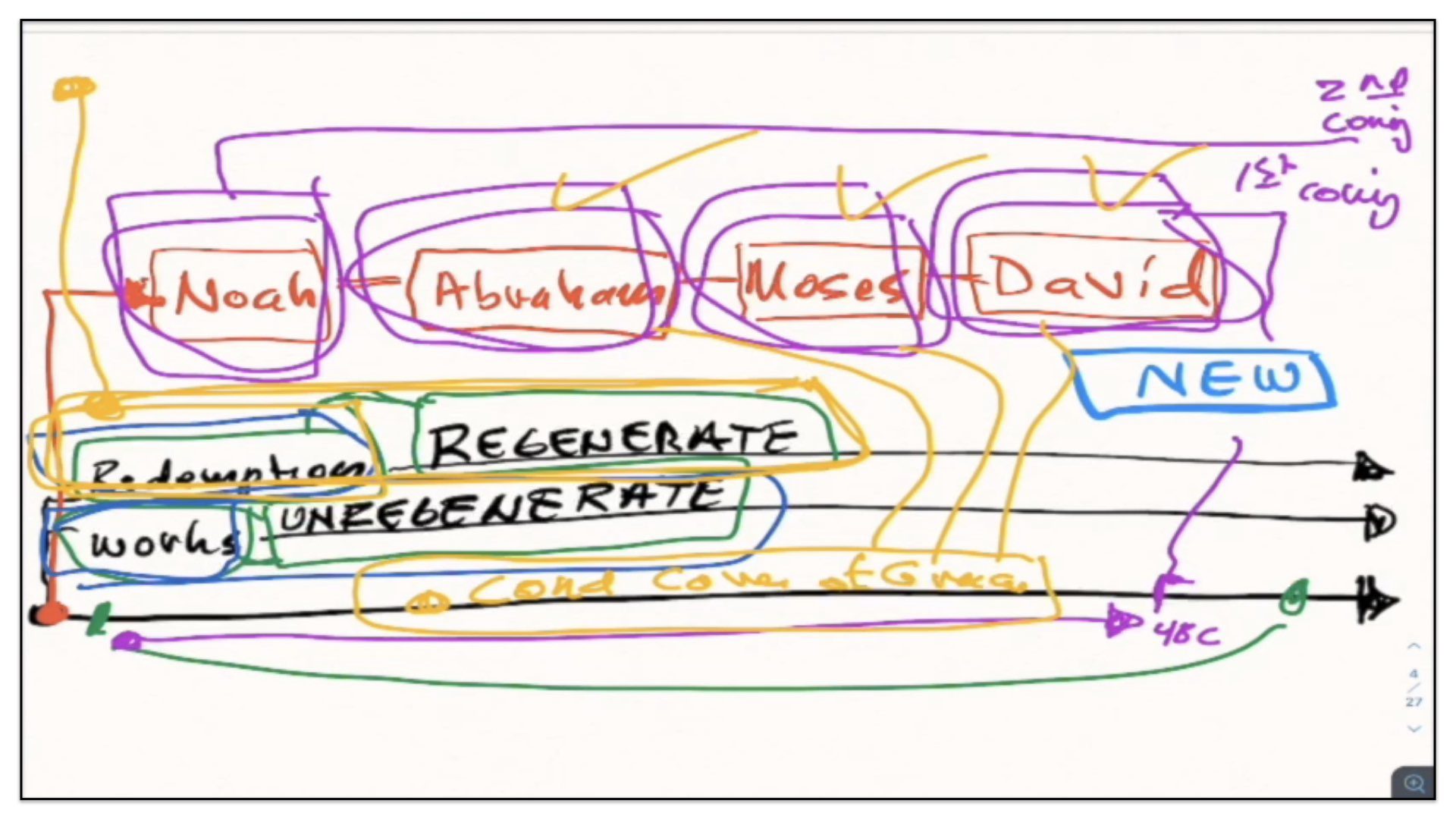
And I emphasize this point because the Presbyterians and the traditional Reformed Baptists, they believe the covenants God made with Abraham, and with Moses, and with David are one and the same with a conditional Covenant of Grace. Of course, they don’t believe that these earthly covenants are one and the same with the Covenant of Redemption, because they believe the Covenant of Redemption never penetrates time. They believe the Covenant of Redemption exists in the backdrop of history. And they therefore invent, they imagine a different covenant separate from the Covenant of Redemption, a conditional Covenant of Grace, and they say that these earthly covenants are one and the same with this conditional Covenant of Grace. And I don’t believe that’s true. I don’t believe there is a conditional Covenant of Grace. Therefore, they cannot possibly be the same as that covenant. And as for the Covenant of Redemption, this, as I have explained, is a very different covenant than that which God made with Abraham, Moses and David. And you see, my point is this—if we mix together these earthly covenants with the Covenant of Redemption, or in any respect a spiritual and perpetual covenant of any kind, then we are undermining the very purpose for which God created, established these spiritual covenants. And we are also dismantling God’s masterplan for the ages.
If The Spiritual And Perpetual Covenants Are Mixed With The Earthly And Temporary Covenants, Then God’s Purpose For The Spiritual Covenants Is Undermined And His Masterplan For The Ages Is Dismantled
“But,” you might ask, “how can you say that? What exactly do you mean—that God’s purpose for the spiritual covenants is being undermined and God’s masterplan for the ages is being dismantled?”
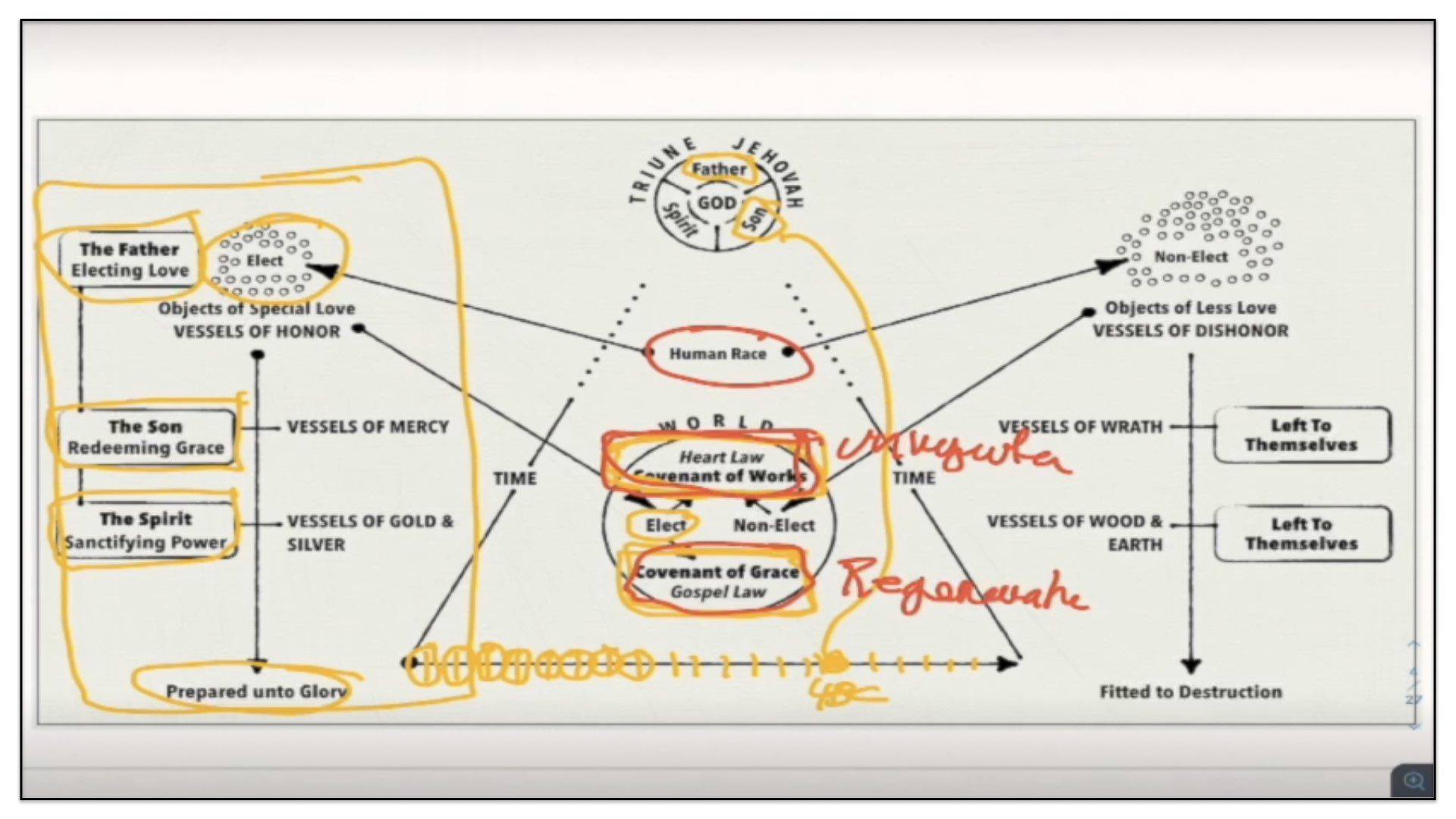
Well, let me explain to you exactly what I mean. But I refer you once again to the Framework of Sovereign Grace. I’ll choose a different color pen. Let me go back to the color red. Watch. There is within the Framework of Sovereign Grace only two spiritual and perpetual covenants under which the members of the human race are subject unto God. All unregenerate sinners are subject to God under the authority of the Covenant of Works and all regenerate sinners are subject to God under the authority of the Covenant of Grace.
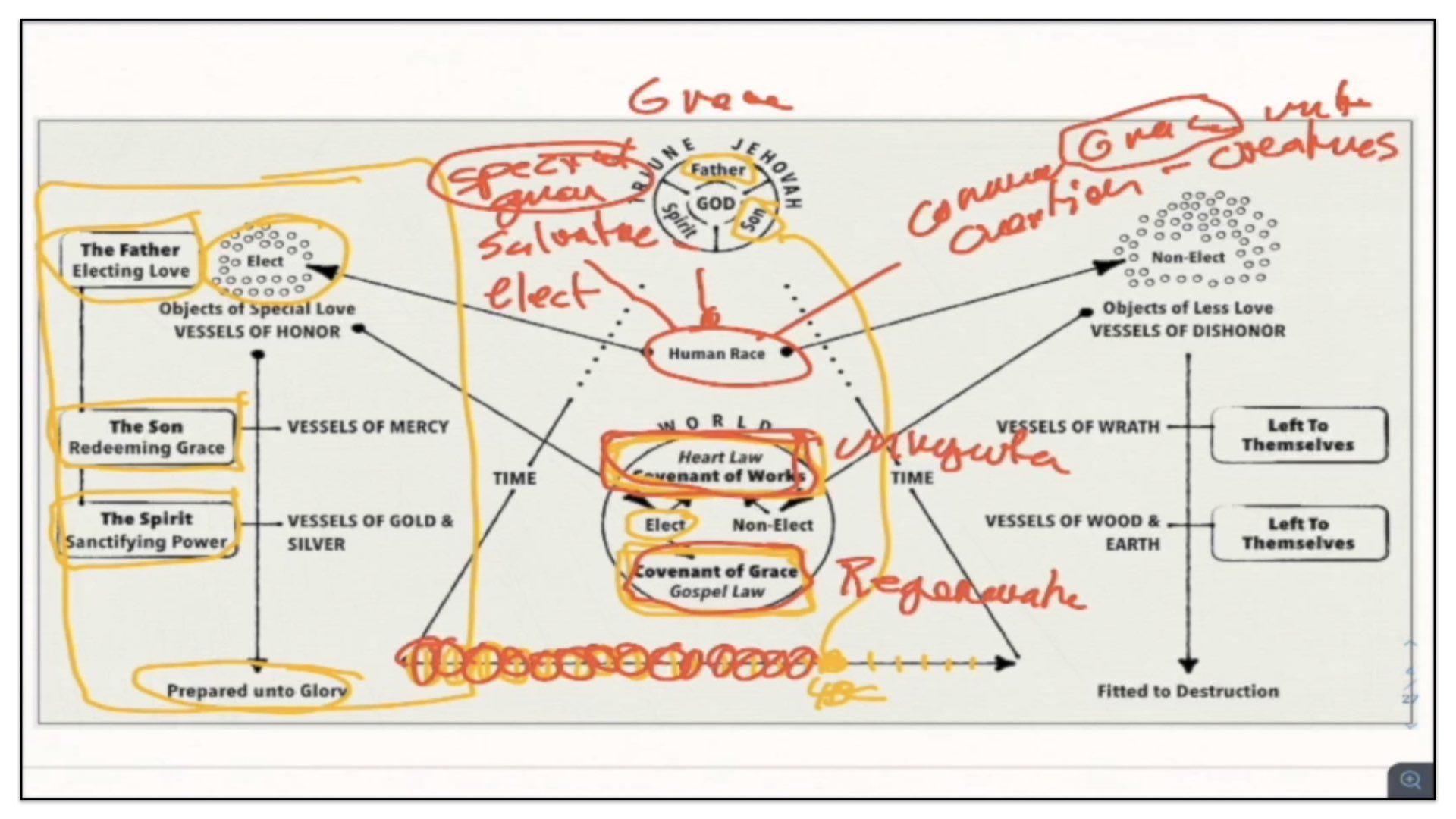
And you see, God’s masterplan for the ages is to administer His grace to the members of the human race. There happens to be a common grace unto creation which God extends to all of His creatures, there’s no saving virtue in this type of grace, it’s simply a favor and good will God has to all creatures. The sun rising on the just and the unjust, as well as the rain falling, and so forth. There is, however, on the other hand a special grace of God unto salvation which is extended to all of His elect people. And God is administering that special grace unto salvation throughout the ages, when He regenerates all of those He has chosen and the Son has chosen to redeem.
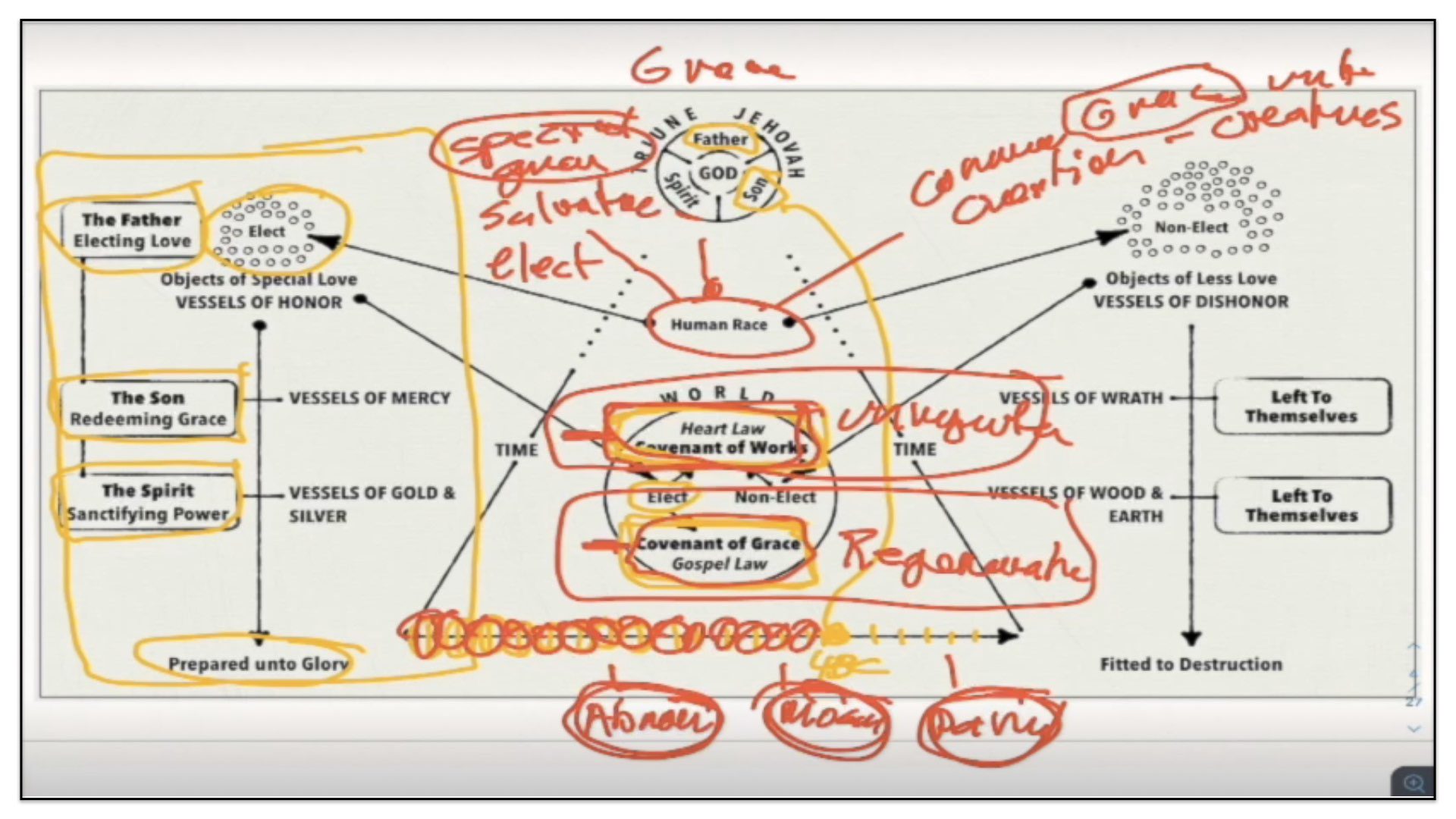
Now you see, if you now take the earthly covenants God has made, let’s say with Abraham, or with Moses or with David, and you somehow link those covenants with these two perpetual and spiritual covenants, you’re now undermining the integrity of these two spiritual and perpetual covenants. These spiritual and perpetual covenants stand alone and are separate, independent, autonomous from any other covenant mentioned in scripture.
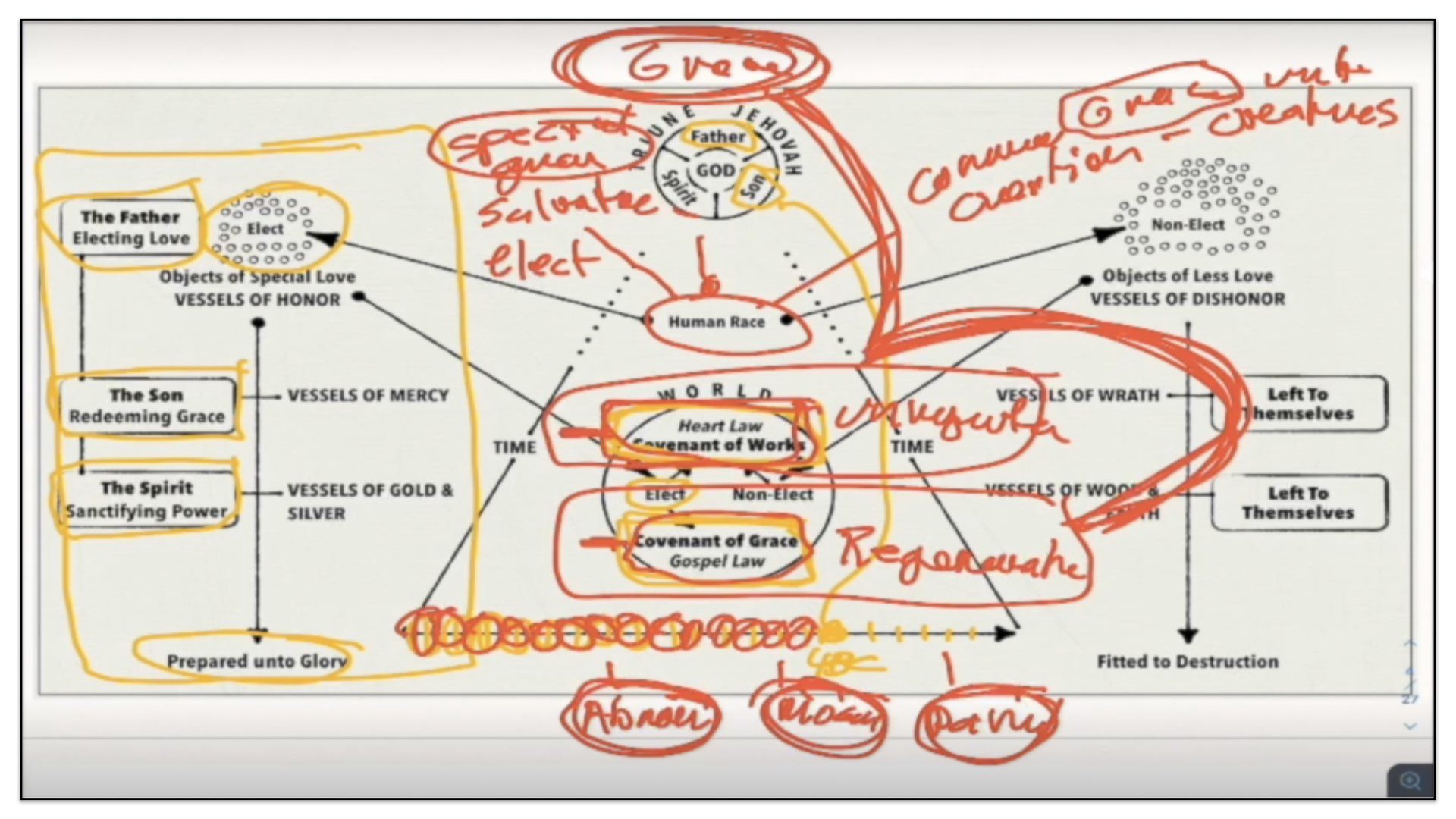
At the same time, if you were to mix together these earthly covenants God made with Abraham, Moses and David with the spiritual covenants, then you’re dismantling the masterplan of God for the ages. For God’s masterplan for the ages is to administer His grace, through one or the other of these two covenants—the Covenant of Works or the Covenant of Grace or Redemption.
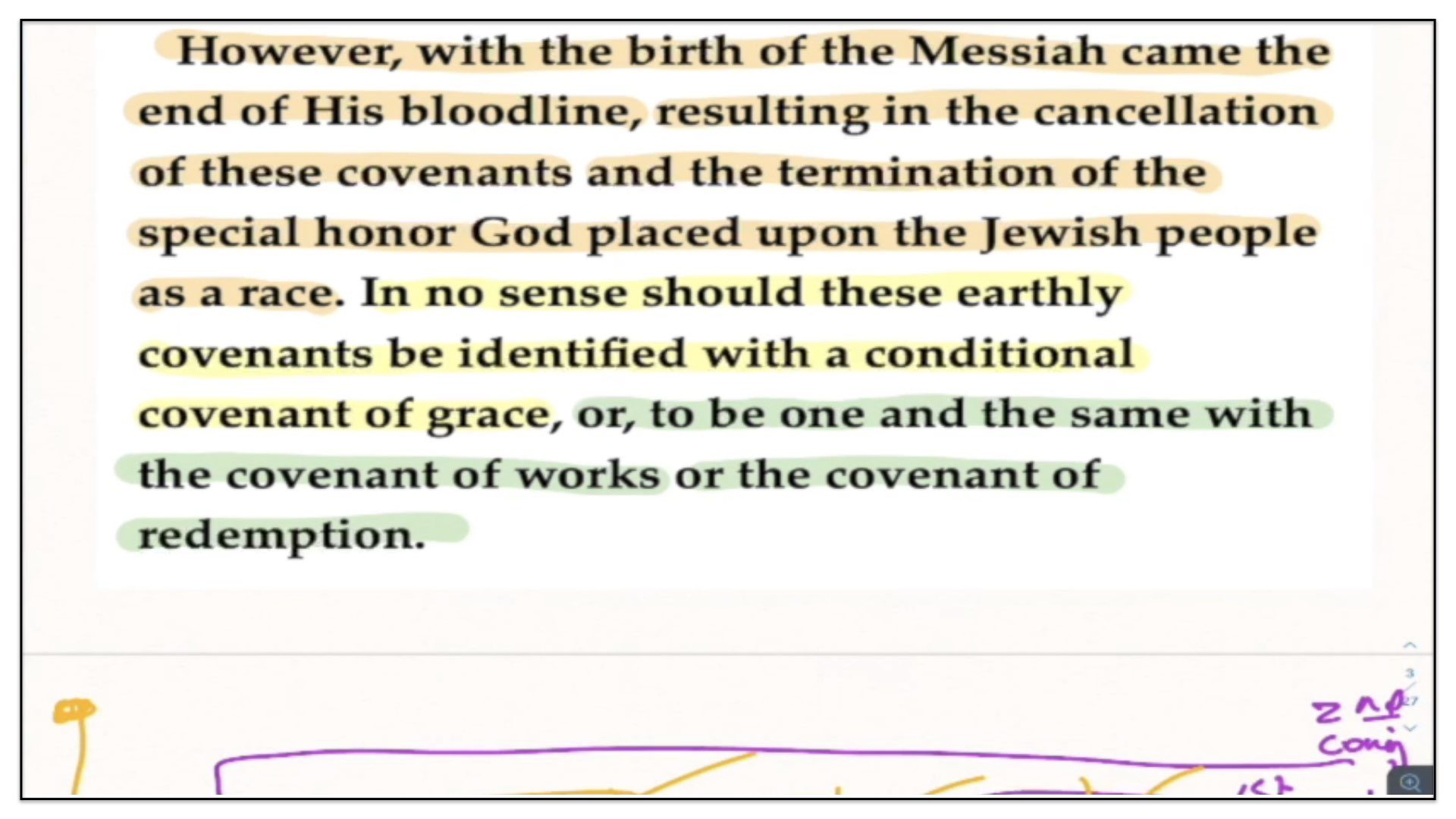
I hope you see the points I’m driving at here and insisting why I mentioned in this statement, that in no sense should these earthly covenants be identified with a conditional Covenant of Grace (that covenant doesn’t exist), or to be one and the same with the Covenant of Works or the Covenant of Redemption. The earthly covenants are entirely separate from these spiritual and perpetual covenants. I hope you’ve followed the points I’ve made.
The Purpose For Which God Established A Covenant With Noah, Abraham, Moses And David—In Prospect Of The Coming Messiah And In Honor Of Their Biological Link To Him
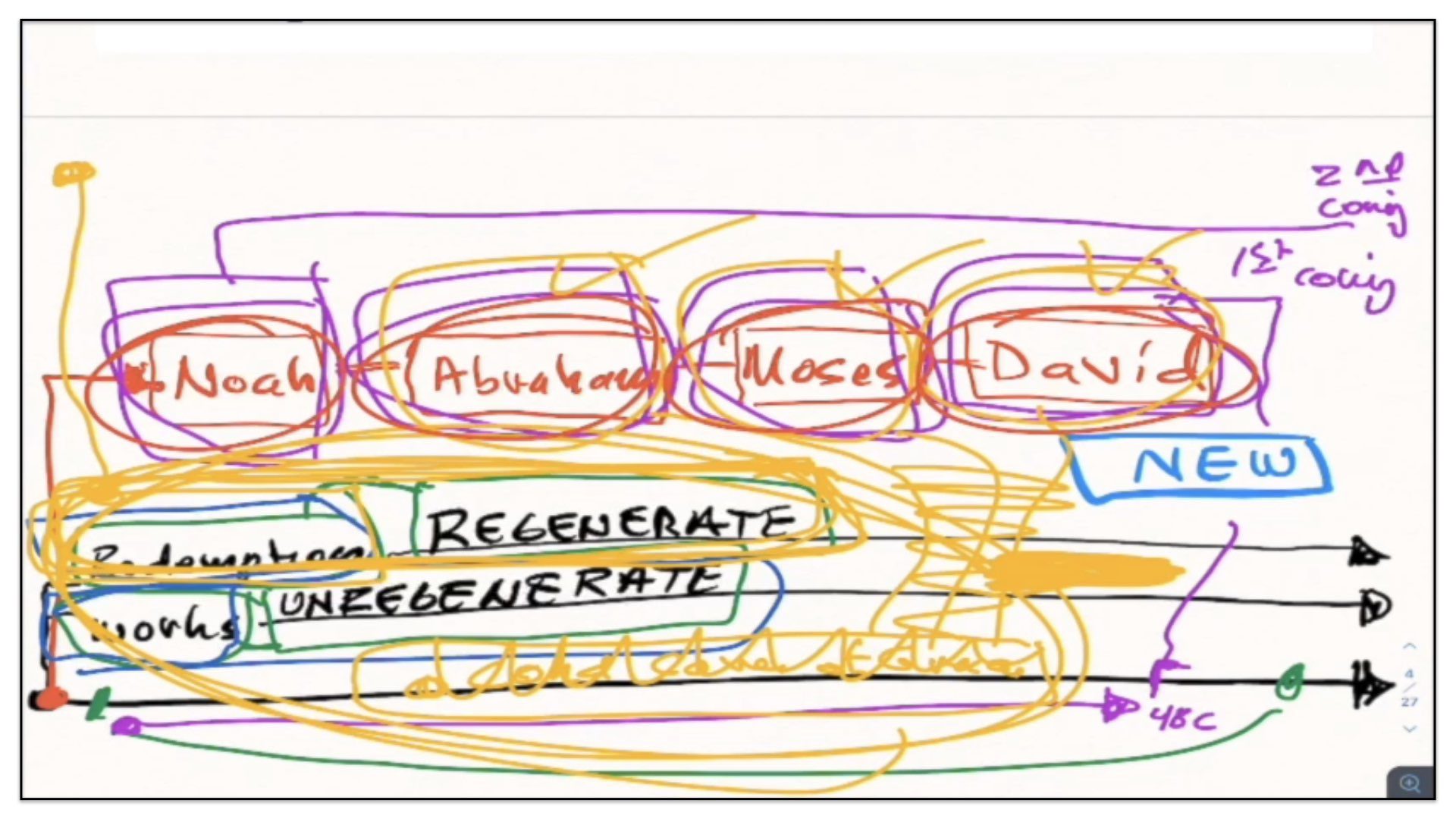
Okay. Well, you might then ask, “For what purpose did God establish these earthly covenants with Noah, and Abraham, and Moses and David if it be not for spiritual and eternal purposes?” Well, this brings me to the final part of my prepared statement on the four earthly covenants. This is the final part of my statement:
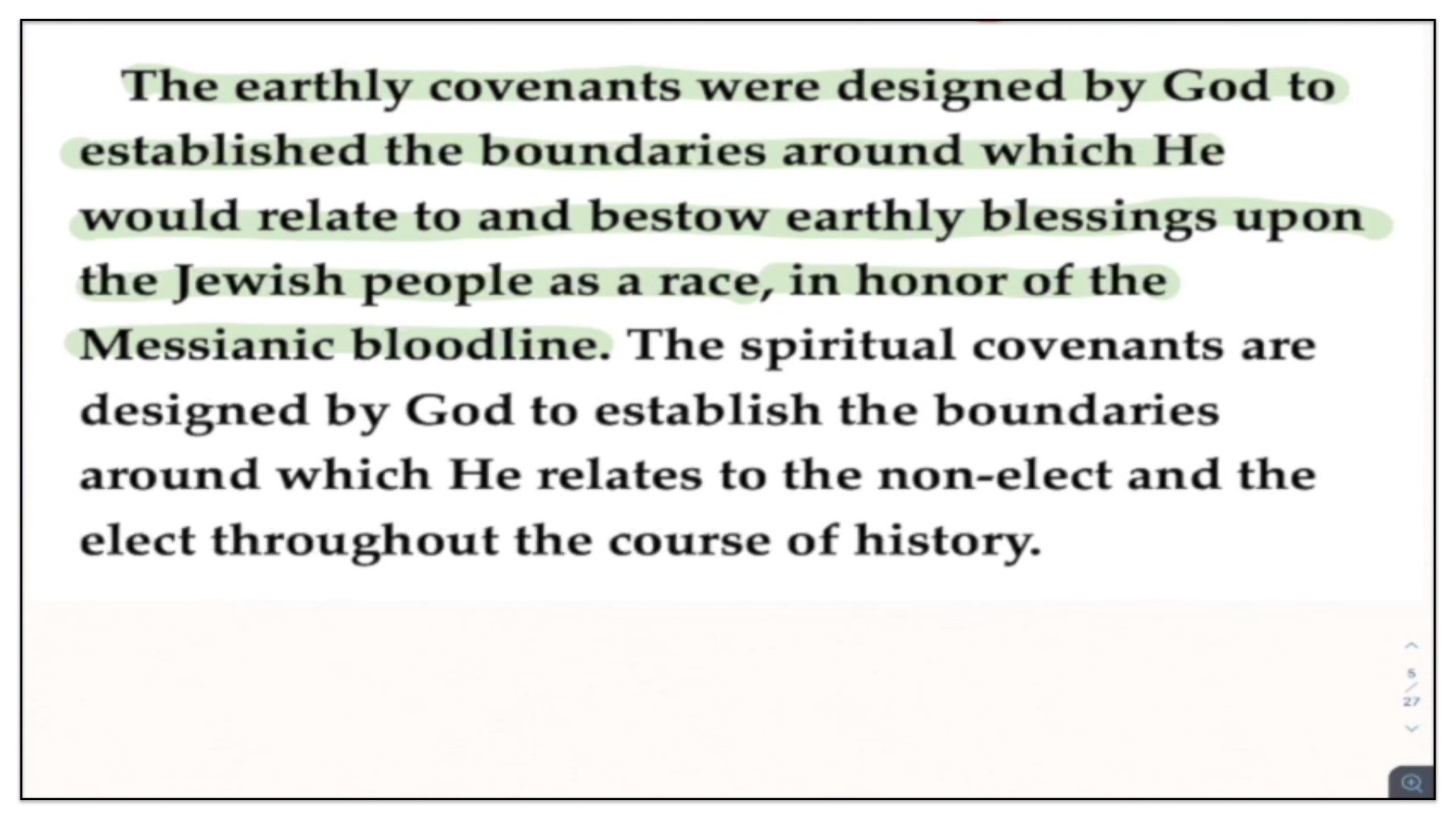
“The earthly covenants were designed by God to establish the boundaries around which He would relate to and bestow earthly blessings upon the Jewish people as a race in honor of the Messianic bloodline.”
I know that’s a mouthful, but within that statement is contained the summary of the answer to the question. What’s the purpose of the four earthly covenants and particularly the three covenants God made with Abraham, Moses and David? Let me read it again for you. Listen carefully—“The earthly covenants were designed by God to establish the boundaries around which He would relate to and bestow earthly blessings upon the Jewish people as a race, all of which was in honor of the Messianic bloodline.” Remember, just as it’s natural for you and I to bestow special honor upon the members of our own family, so God chose to bestow special honor upon the members of the Messiah’s family.
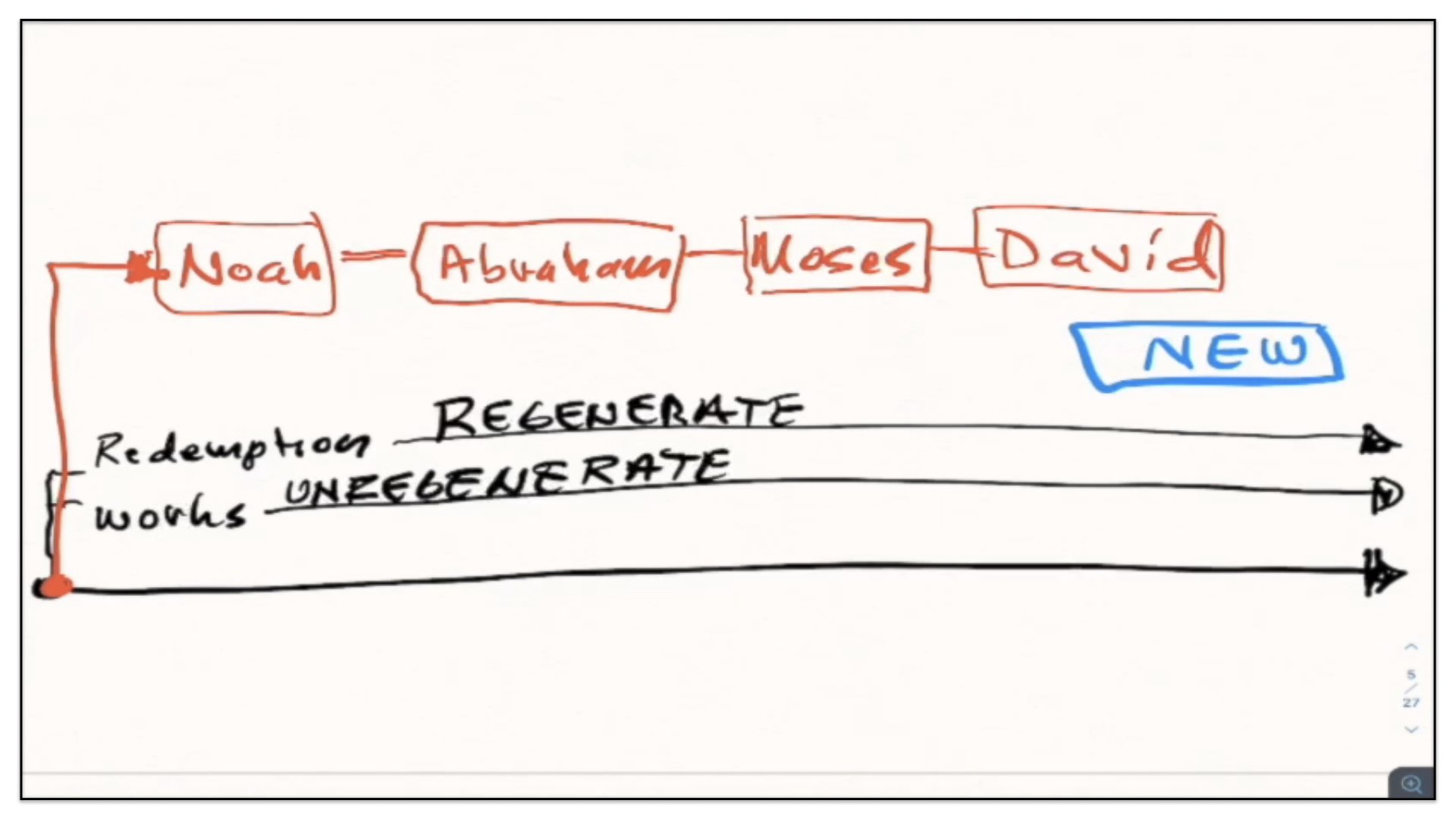
If I refer you again to a clean timeline and diagram of the biblical covenants.
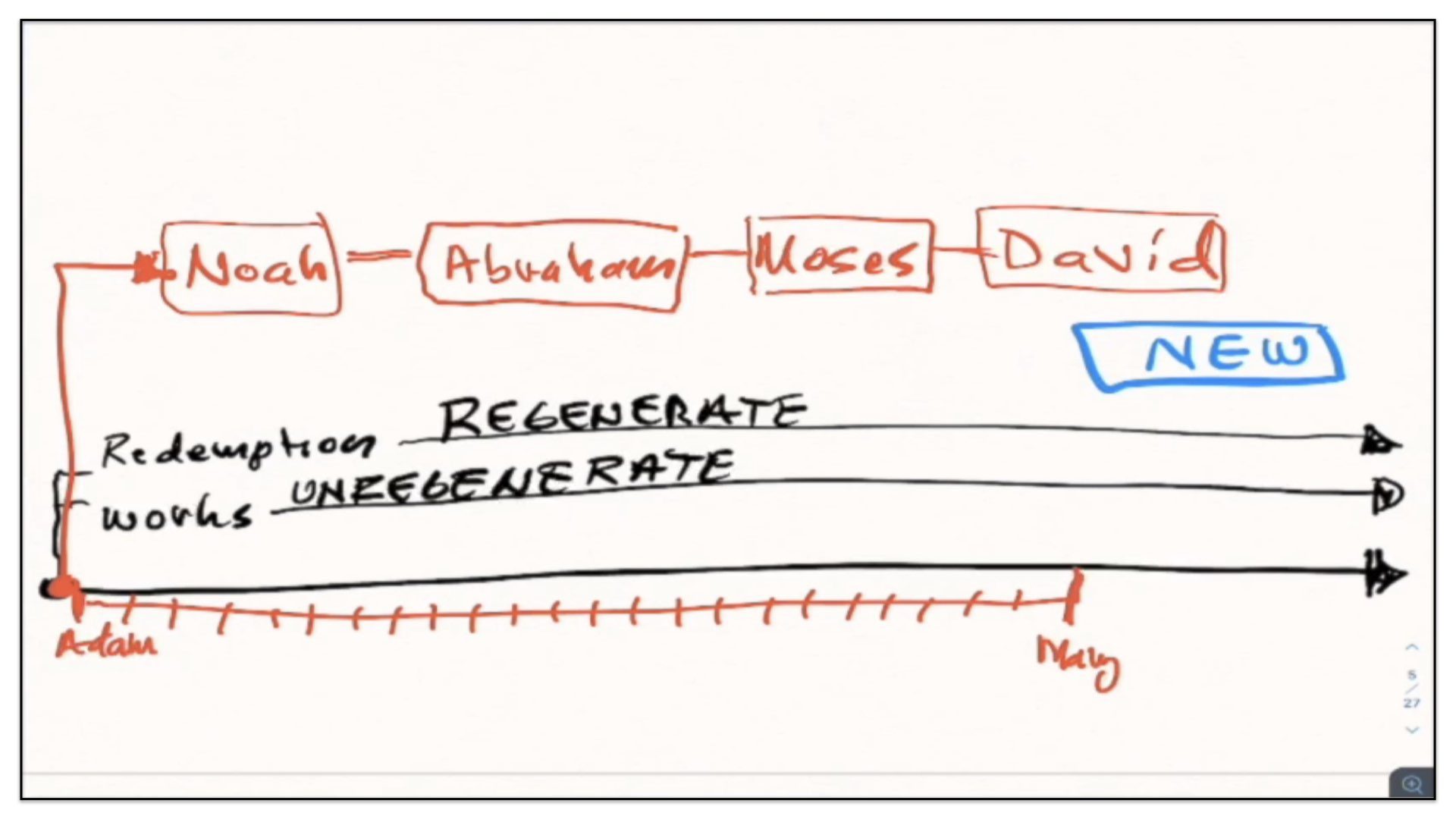
If you were to follow the biological line, beginning with Adam and Eve in the garden of Eden, running through the scriptures and ending or culminating with the virgin Mary, the mother of Jesus, all of these men and women recorded throughout the Old and New Testament scriptures, you’ll discover, all of these persons were set apart by God with special honor. God bestowed upon them many physical and earthly, material blessings.
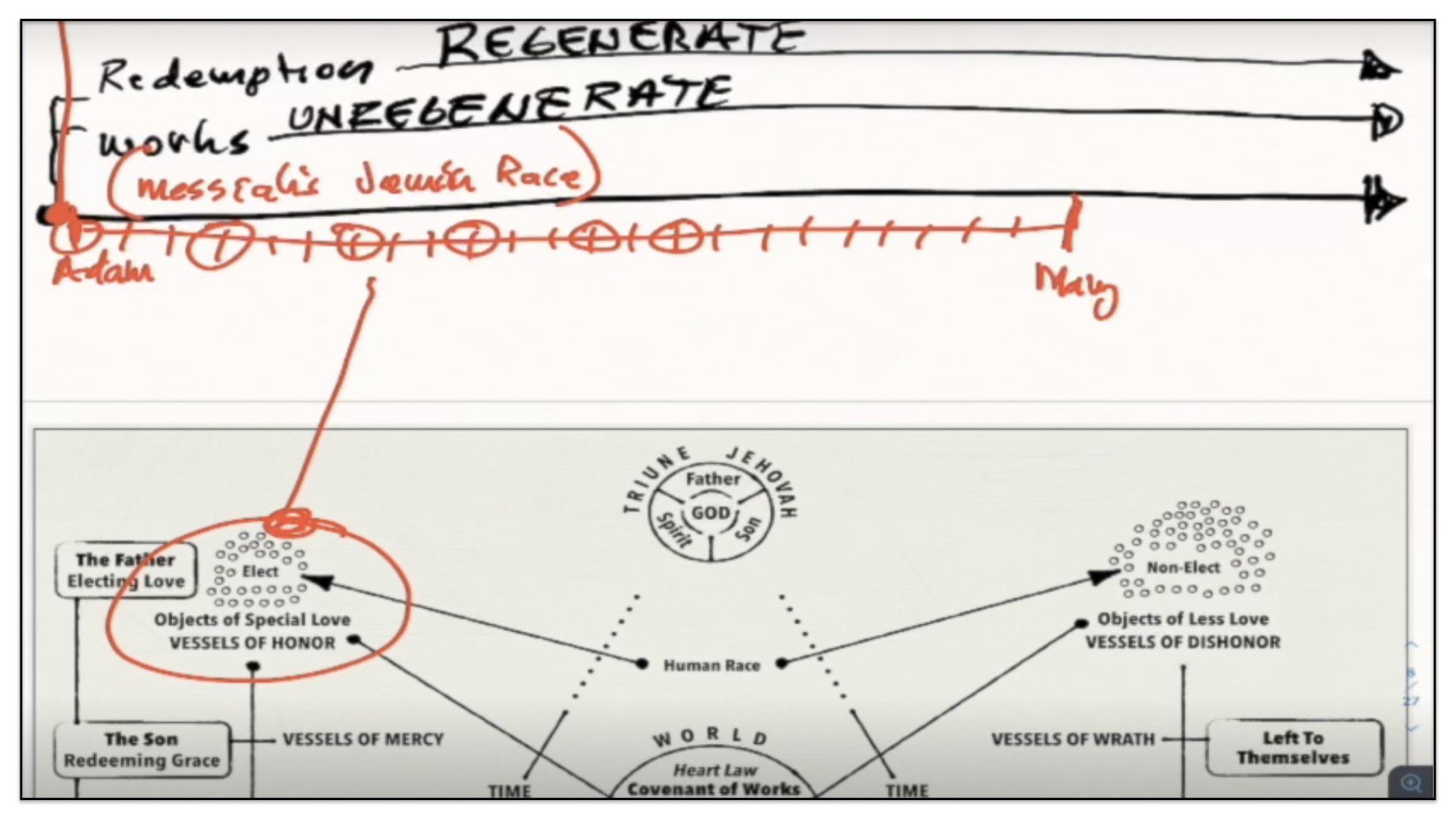
Now watch this. Some of the Messiah’s ancestors were also numbered among God’s spiritually elect people. They were part of the Messiah’s bloodline who would later become the Jewish race. They were part of that earthly biological bloodline and God honored them physically for that relationship. But some of these persons were also spiritually elect. Not all of them, but some of them were.
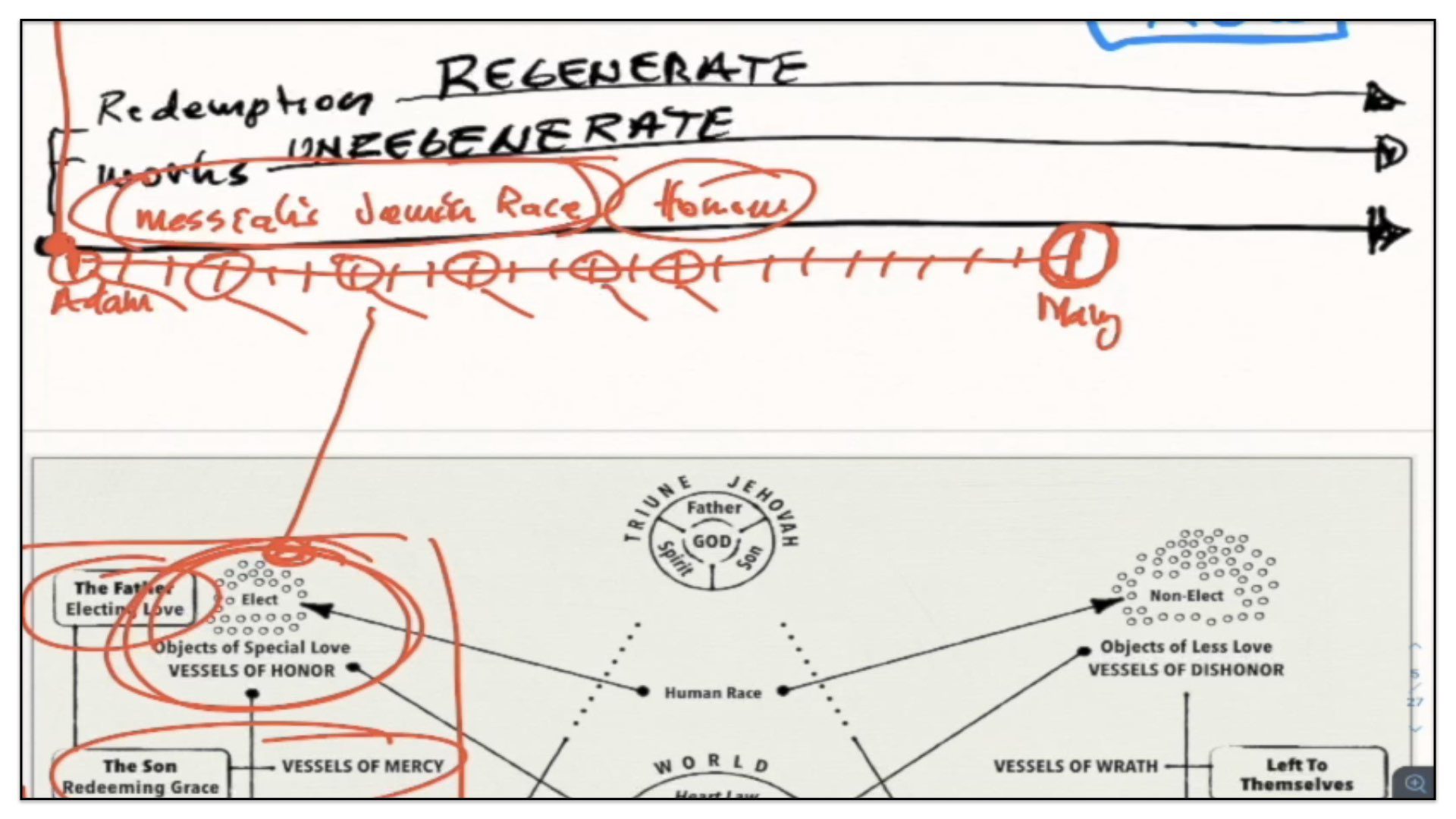
And do you see the distinction between the Jewish people as a race and how God set a special honor upon them by virtue of their ancestry to the Messiah. But in addition to those earthly blessings, bestowed upon that people as a race, God also had set some of them apart as objects of special love in a spiritual sense. They were truly redeemed by Christ, chosen by the Father, regenerated by the Spirit of God. And you see, it’s this failure to distinguish between these two groups of elect people that has caused so much confusion among Christians.
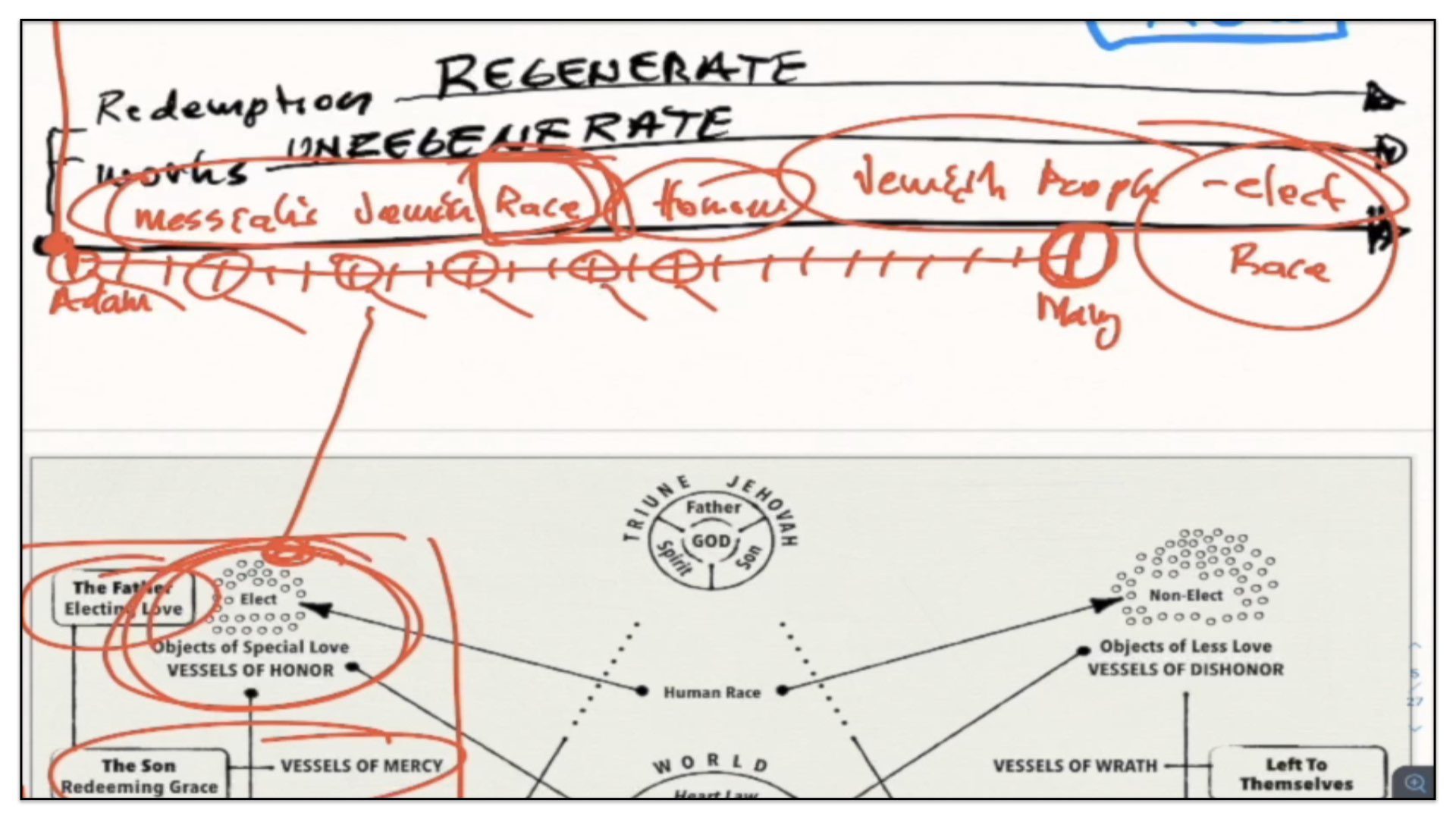
In one sense, the Jewish people are called God’s elect, which is true. They are an elect race of people; an election based on race; the Messiah’s bloodline.
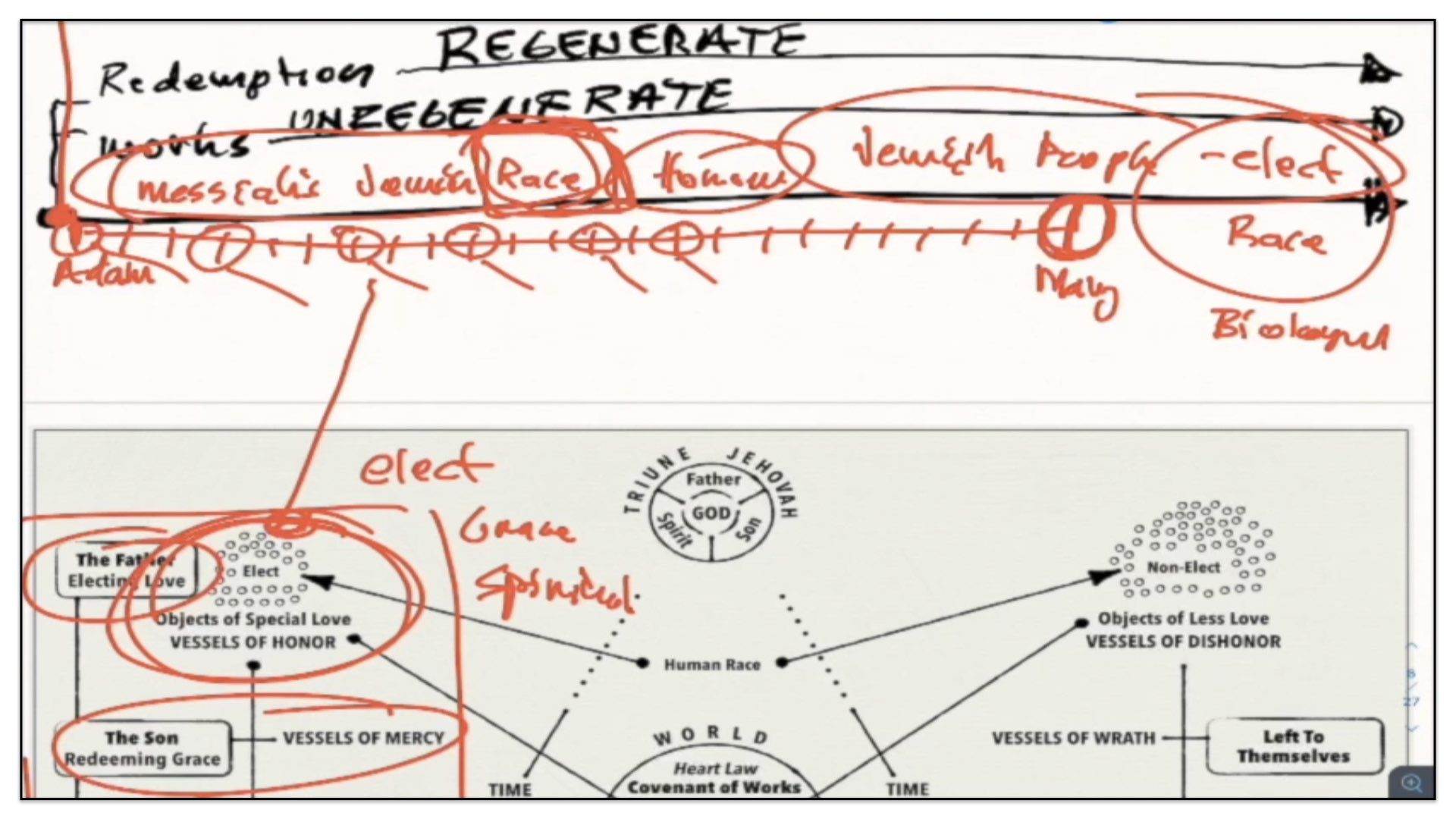
But the scriptures also speak of another elect people. An election not based on race, but an election based on grace. And this is not a biological line leading to the Messiah. It’s a spiritual line. And you see, the scriptures speak both in the Old and New Testaments of these two different groups of elect people. A physically elect people belonging to the bloodline of the Messiah, later would be known as the Jews, the Jewish people, Israel, the Jewish race. And then the scriptures speak also of a spiritually elect people. And these two groups of people are entirely separate. They’re not one and the same.
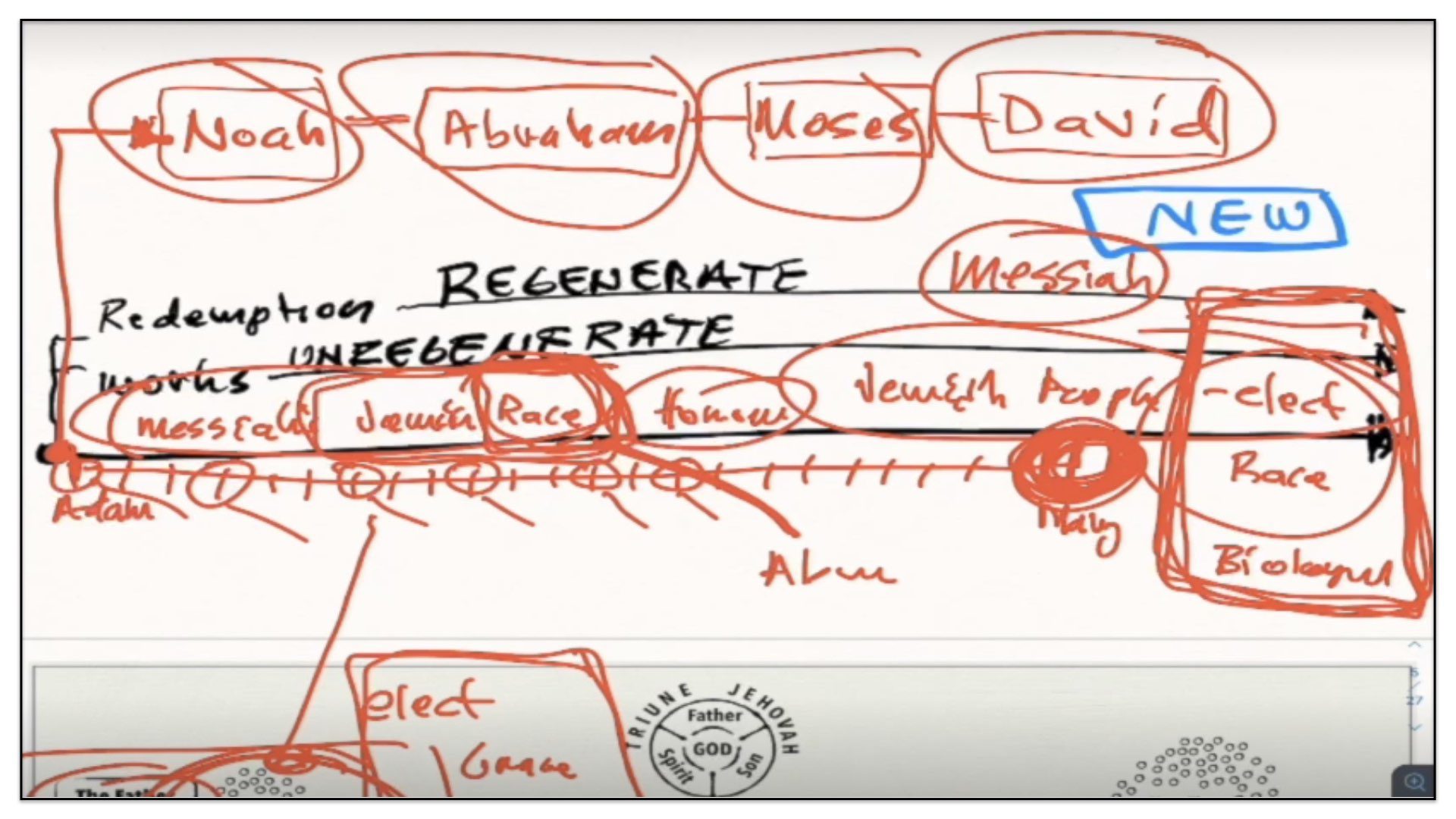
Now, God made special covenants with members of the Jewish race. Covenants with Abraham—well here, they are covenants with Abraham—with Moses, with David, even with Noah.
And all I’m trying to get across to you here is the significance of these earthly covenants. It belongs to this aspect of God setting apart the Jewish race as a people, honored by virtue of their physical, biological lineage to the Messiah. God honored the family members of the Messiah in the same way that you and I honor our own family members in distinction from those who do not belong to our particular family. Well, that’s the first thing I want to say in the remaining statement of my view of the earthly covenants.
Throughout The Course Of History, Unregenerate Sinners Have Been And Continue To Be In Relationship TO God Under The Authority Of The Covenant Of Works, Whereas Regenerate Sinners Have Been And Continue To Be In Relationship WITH God Under The Authority Of The Covenant Of Redemption (Grace)

This brings us then to the final statement. Watch this:
“The spiritual covenants are designed by God to establish the boundaries around which He relates to the non-elect and elect throughout the course of history.”
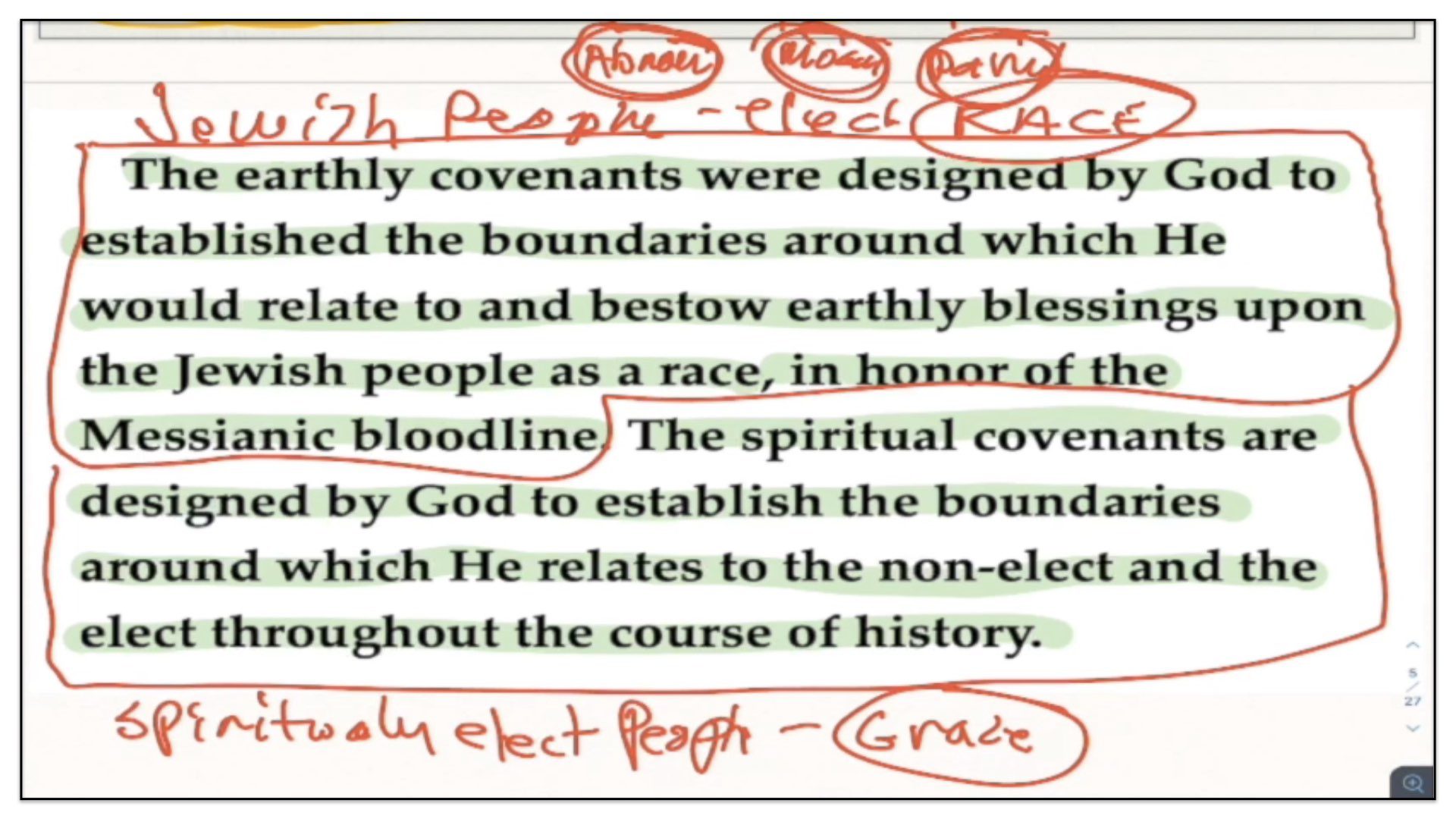
So this part of the statement is dealing with the Jewish people who were God’s elect based on their race, their biological lineage to the Messiah. Whereas this part of the statement is dealing with the spiritual, the spiritually elect people, based on grace. And this has to do with the spiritual covenants, in particular, that of the Covenant of Redemption.
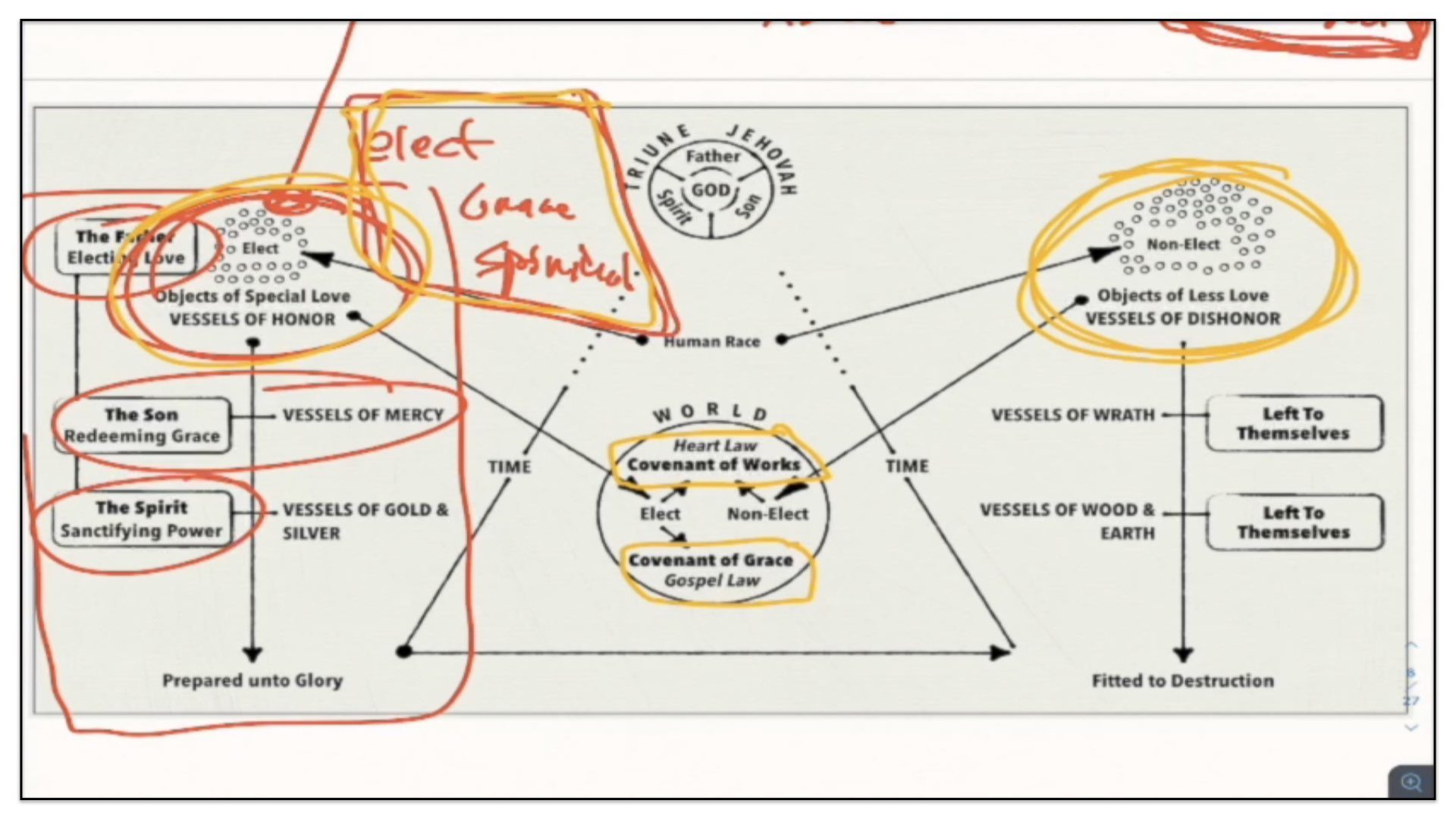
So if I refer you back to the Framework of Sovereign Grace. I’ll choose the color orange to mark out the notes, look. When we speak of the spiritually elect people—here—and we speak of the non-elect, the spiritually non-elect, we’re dealing only with these two covenants, the Covenant of Works and the Covenant of Grace.
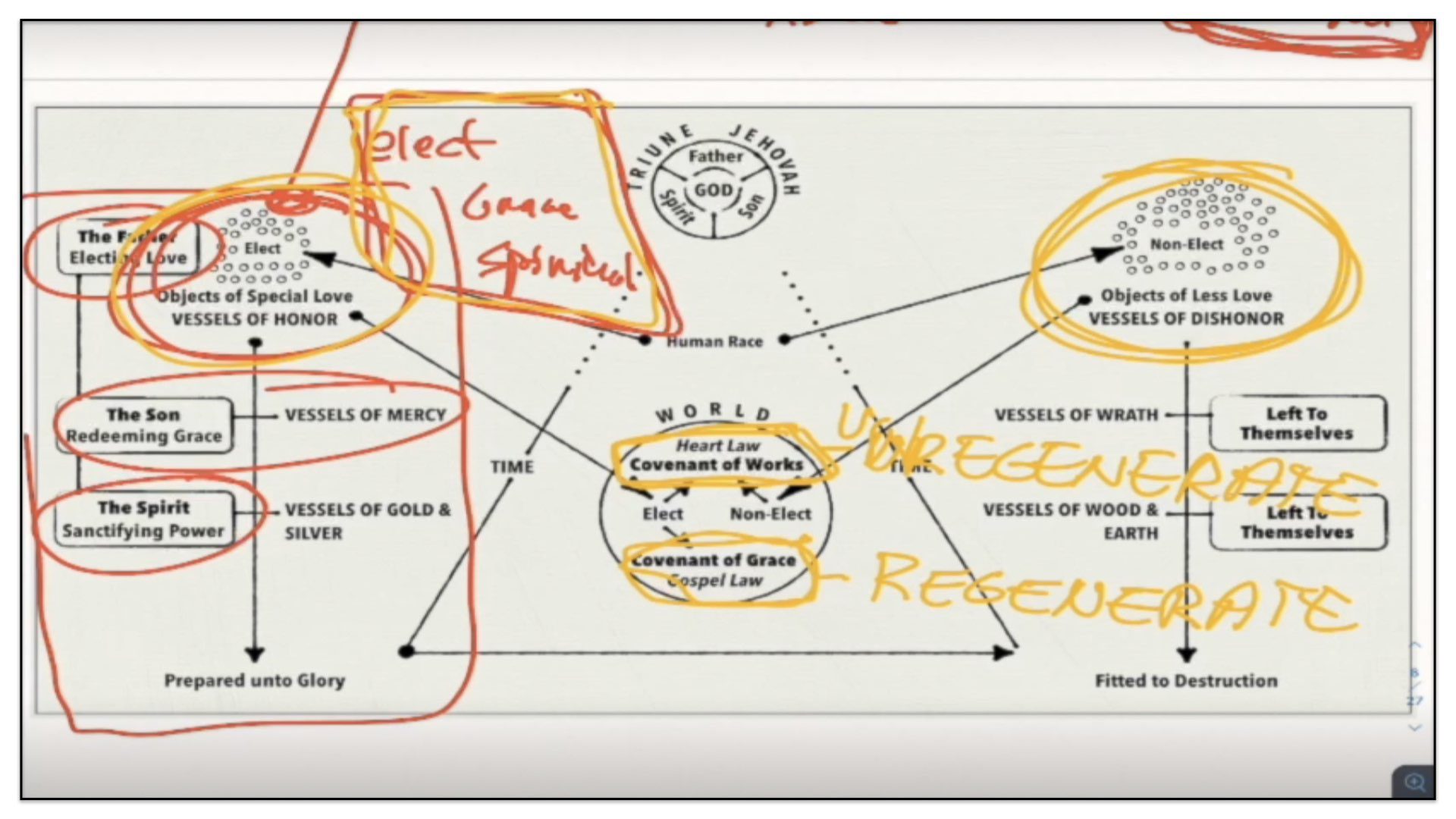
I’m going to emphasize it again because I can never underscore this too often for your benefit to make sure you understand the points. Watch. All unregenerate sinners are under the authority—if I can spell this correctly, it would be a lot better, wouldn’t it—unregenerate sinners are under the authority of the Covenant of Works. Whereas all regenerate sinners are under the authority of the Covenant of Grace.
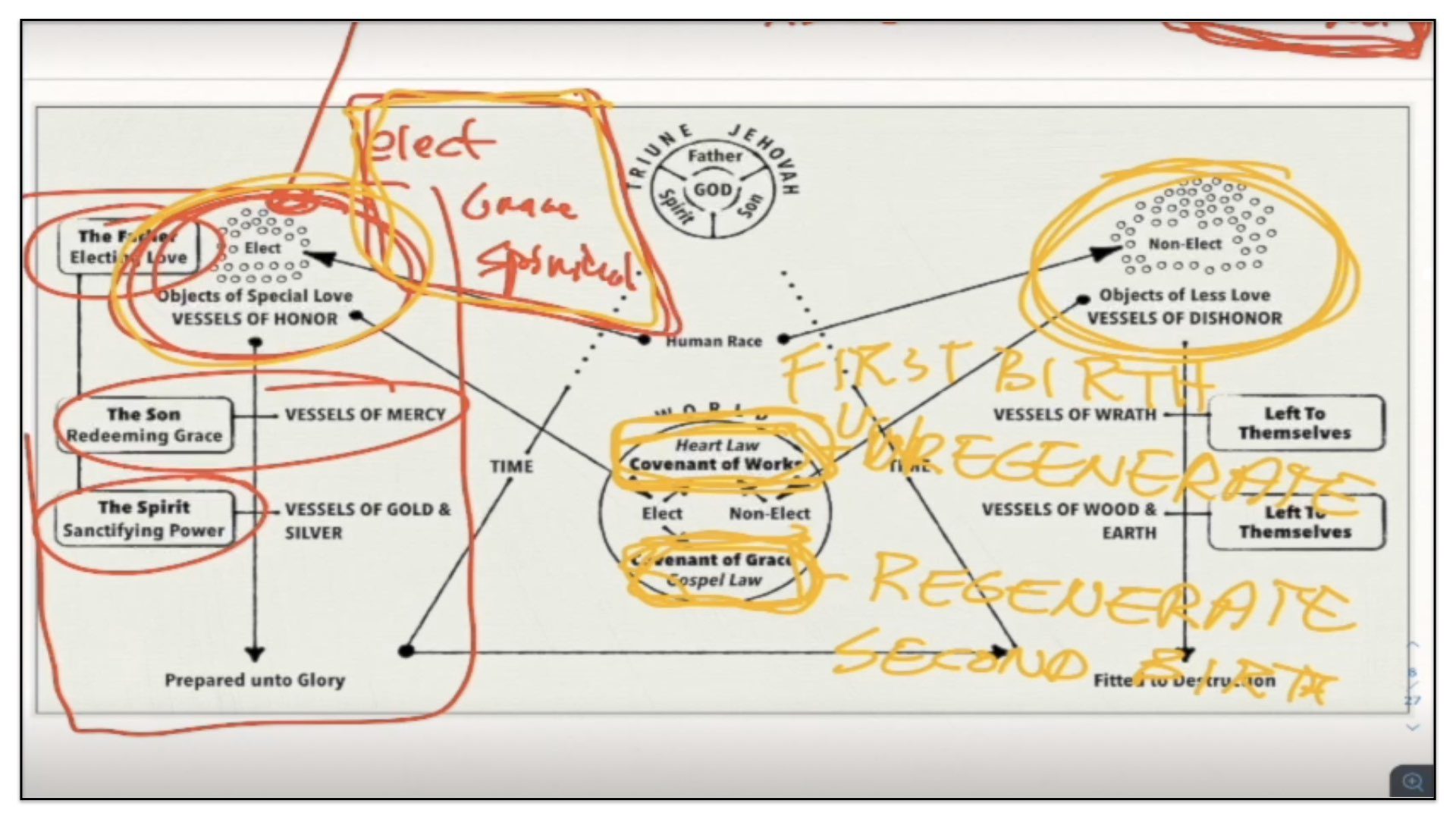
Now watch this. It is at our first birth that we are brought under the authority of the Covenant of Works. But it is at the second birth, born again, that we are brought under the authority of the Covenant of Redemption or the Covenant of Grace, experientially speaking.
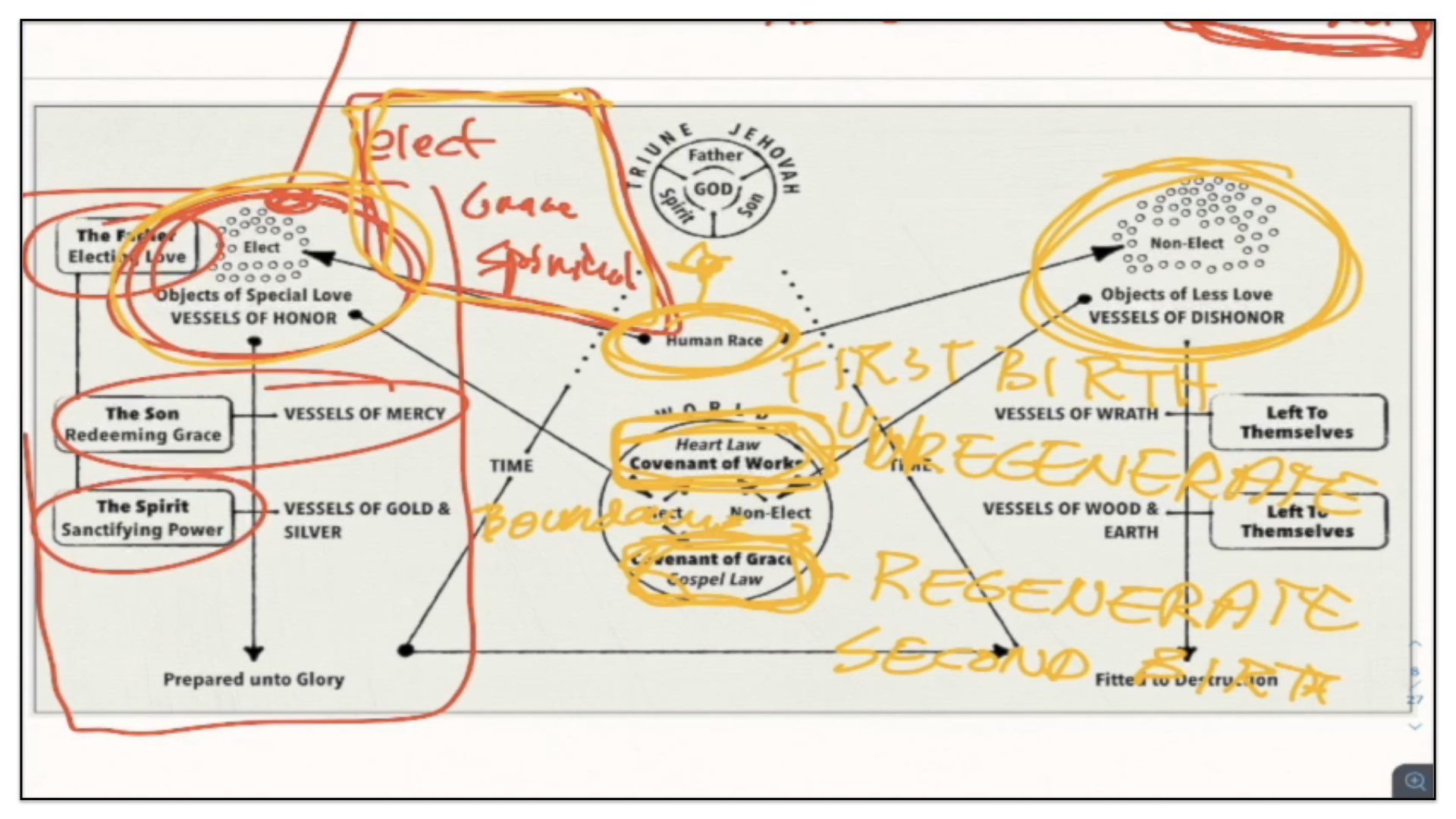
And you see, that’s the whole purpose of these two covenants. These covenants provide the boundaries around which the entire human race is accountable to God.
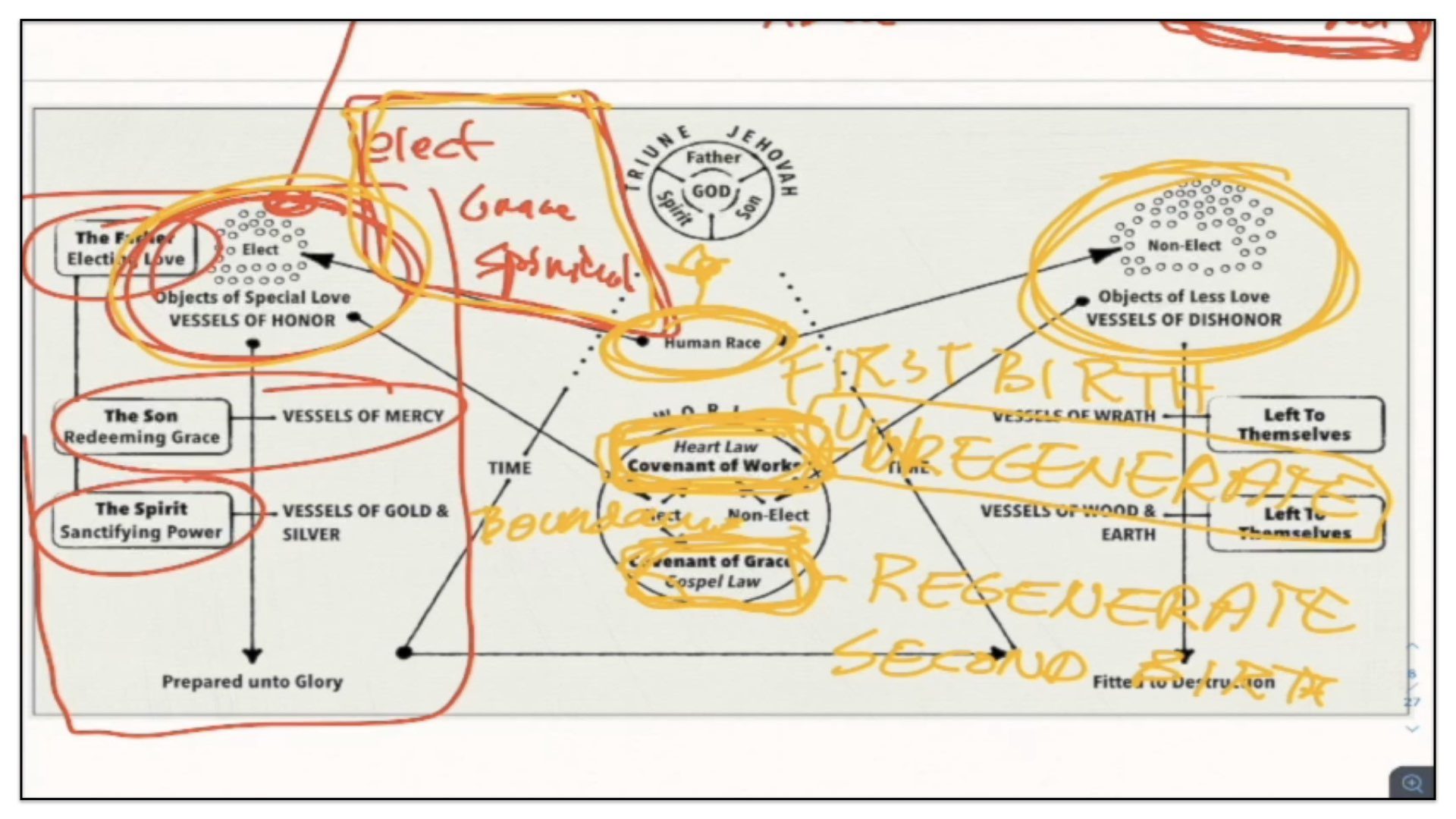
If you’ve experienced the first birth, meaning you now exist in this world, you are an unregenerate sinner. If that’s the only birth you’ve experienced, then you are accountable to God around the boundaries under the authority of the Covenant of Works. God requires of you perfect obedience to the law inscribed upon your heart. And because you have transgressed that law, you are a sinner. And because you are a sinner, you are dead and trespasses and sins. Your soul is cut off from God. The life of God does not flow into your soul and you’re entirely corrupted by sin. Your will is adverse to God. You’re in rebellion to Him. You have pleasure and desire only to sin.
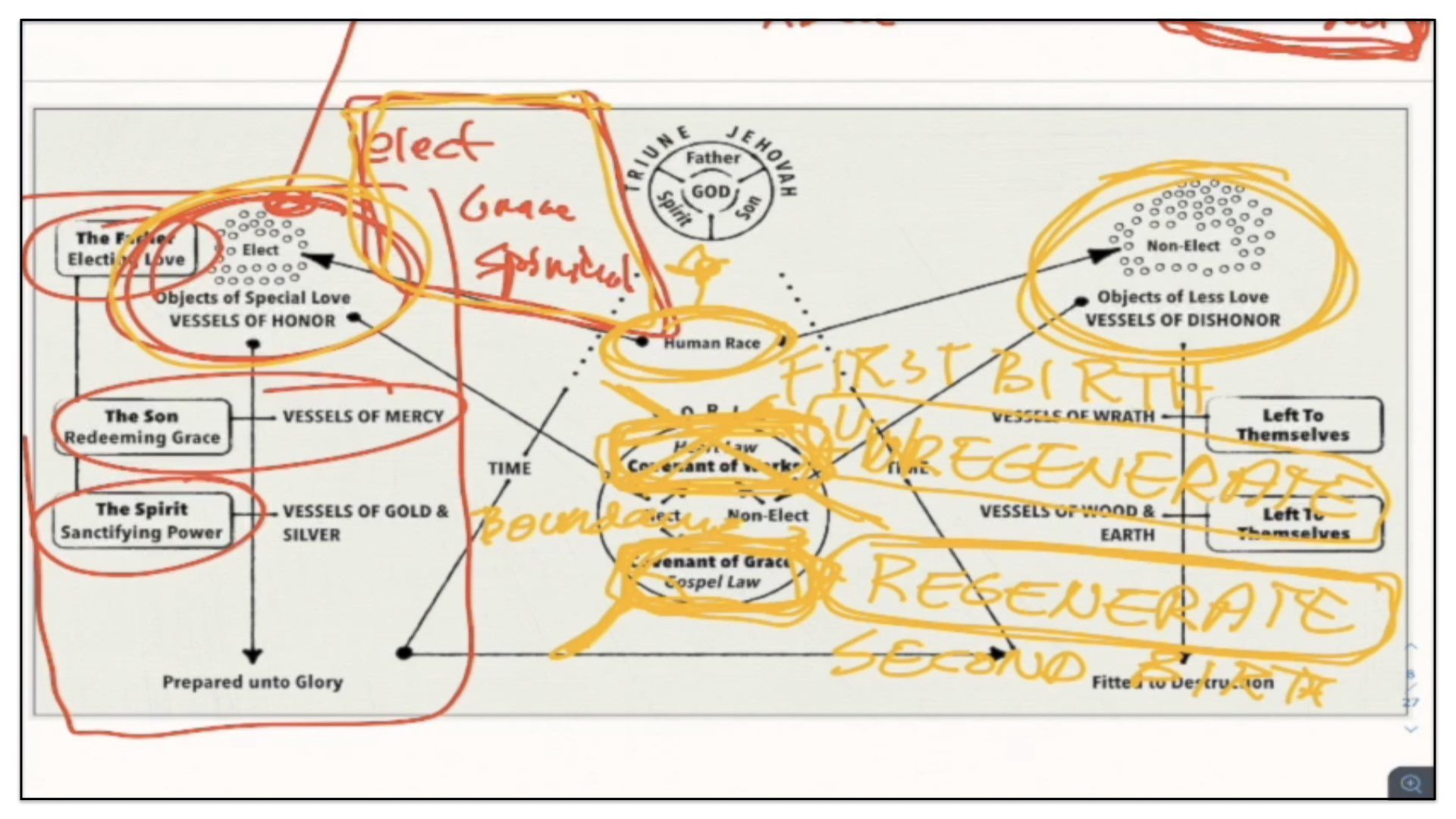
But if you have been born again, then you are a regenerate sinner and you’ve been delivered from the authority, from the boundaries, of the Covenant of Works, because Christ has fulfilled that for you. And you are freed, you’re liberated in Christ, by being brought under the authority of the Covenant of Grace. And now you can exercise all of the fruit of that new nature among which is saving faith in Christ. And your soul, having been united with Christ, His life now flows into your soul making you alive unto God through Him.
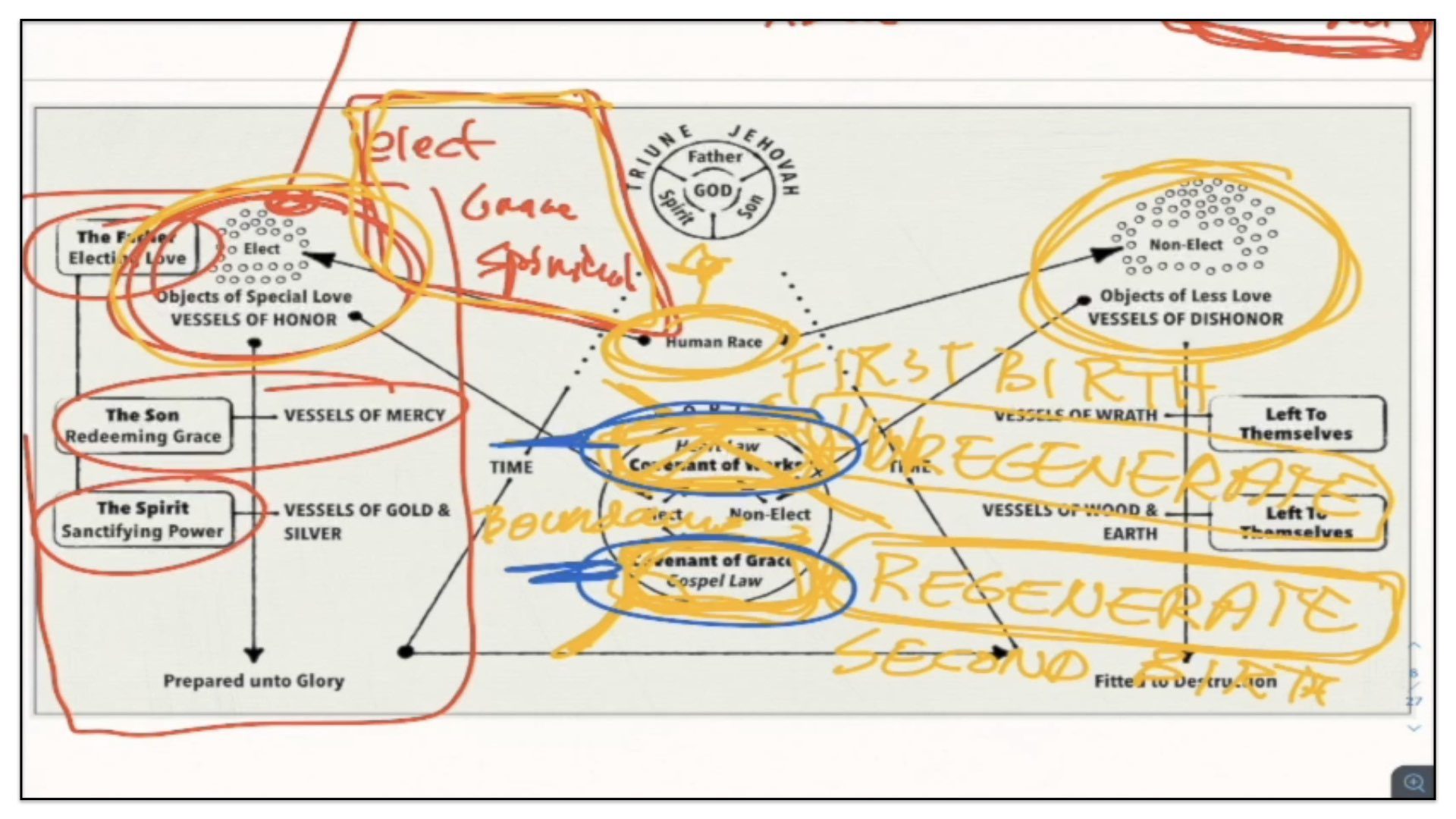
And you see, that’s the whole point here. If you’re wanting to know, my dear friend—whether you be a Jew or a Gentile—if you’re wanting to know what your responsibilities are towards God, it all comes down to one or the other, one of the, one or the other of these two covenants. You are either under the authority the Covenant of Works or that of the Covenant of Grace. It’s that simple.
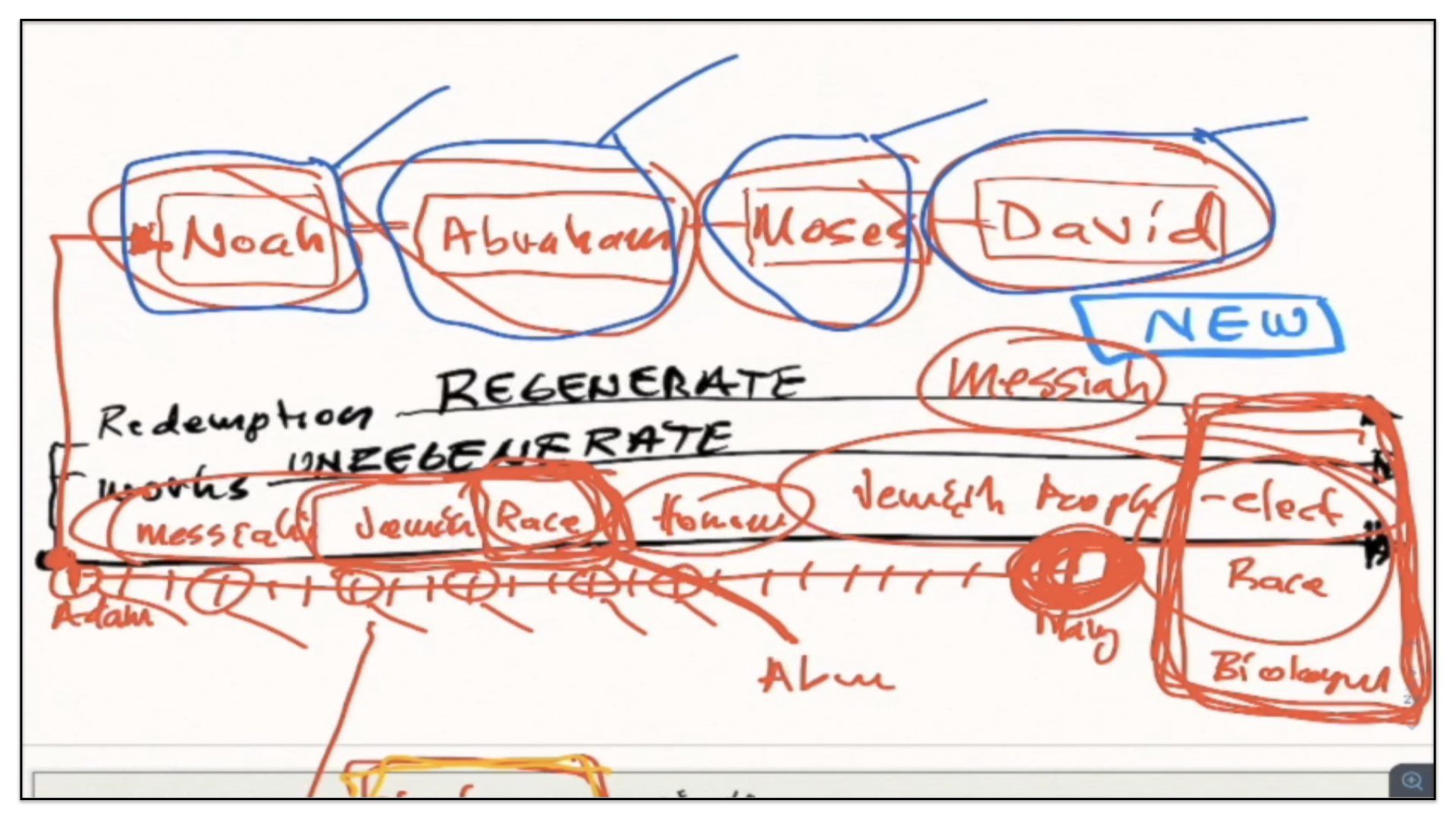
Please, whatever you do, do not get confused with these other covenants mentioned in the scriptures, believing that somehow your responsibilities towards God is to be found under one of these four covenants. Ultimately, that’s not true. These four covenants are important in understanding the various portions of scripture. Yes, it’s vital that we know what is meant by the covenant God made with Noah, and with Abraham, Moses and David.
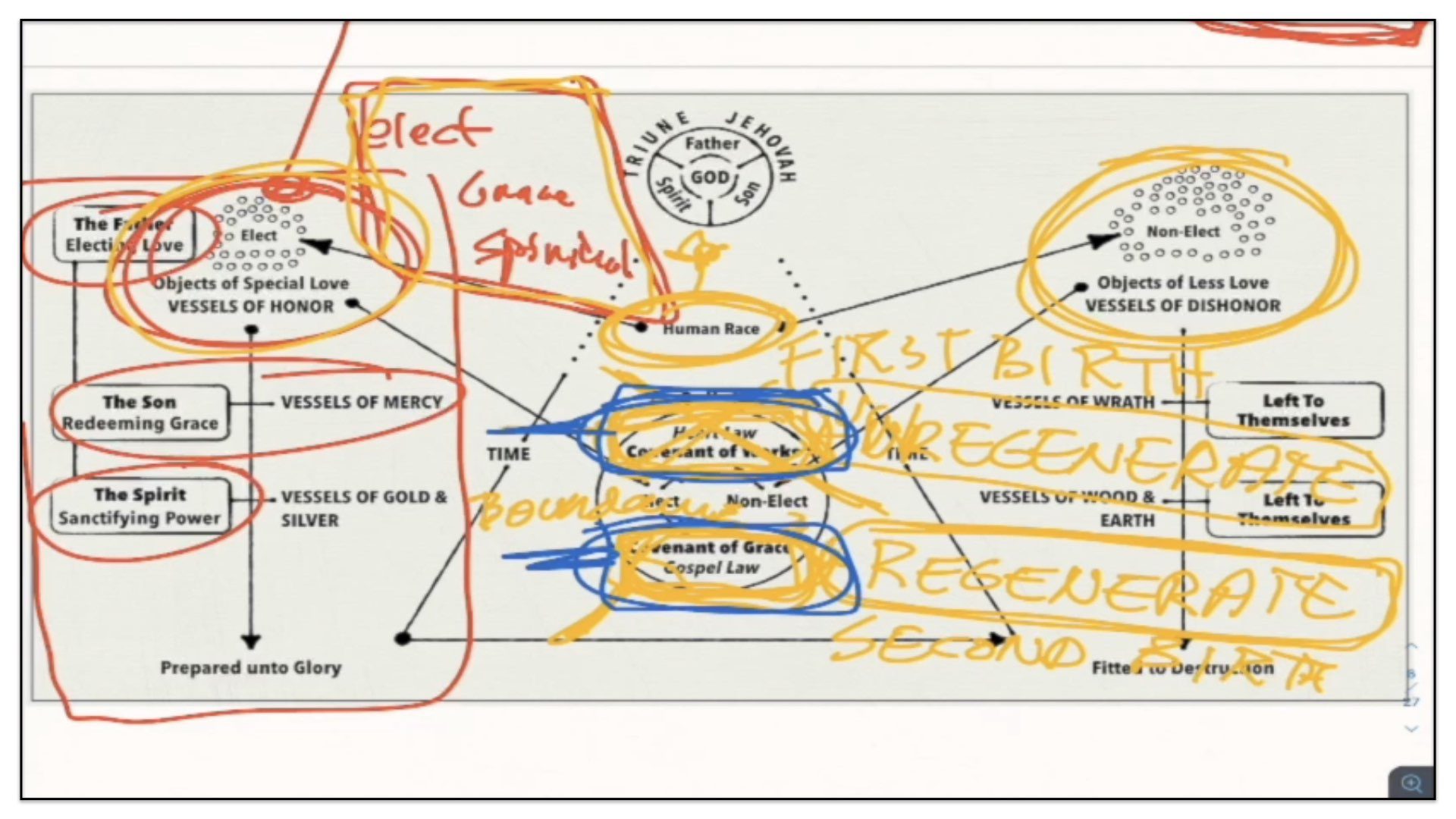
But on the grand scheme of our relationship with God, and His masterplan for the ages, the two covenants of concern are those of Works and of Grace. That’s it!
A Final Word
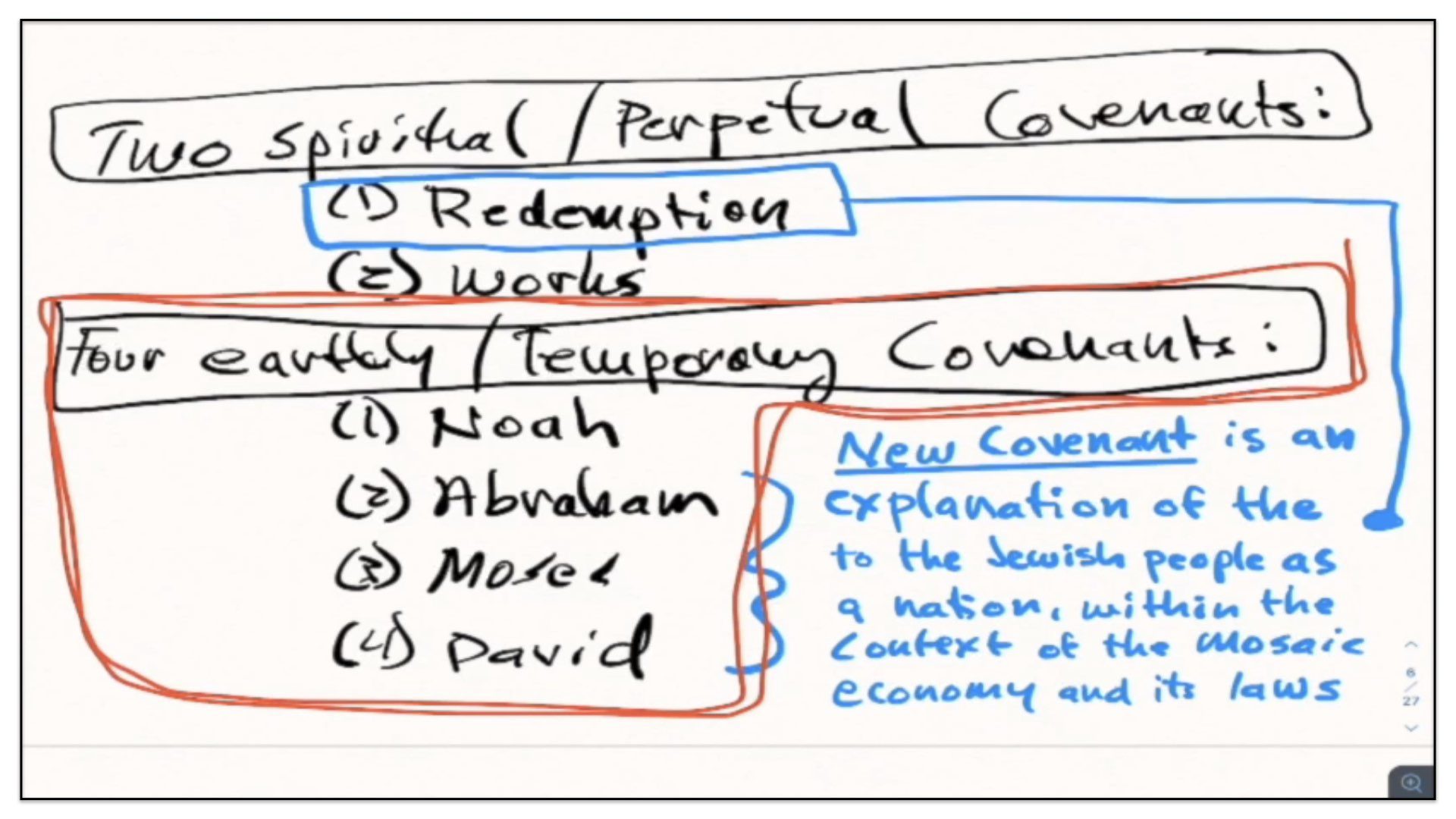
Well, those are my thoughts on the four earthly and temporary covenants. Choose the color red. That’s it. I’ve been looking with you now for six weeks on this particular topic and I can only hope the points I give to you have been helpful. Now, perhaps you don’t agree with everything I presented. Maybe you agree with nothing I presented. Fair enough. But if you take in the time to follow the teachings throughout the weeks, I can only hope that there’s been some things to provoke your thinking. Perhaps it’s caused you to rethink some of the ways you understand the covenants. I just hope that there’s been something said that’s been beneficial to you. I suppose even if you disagreed with it all, that’s still of some benefit because you can now dismiss my teachings altogether, go on your merry way and be confirmed in your own understanding of the issues. If, however, the things I’ve mentioned to you have been helpful to the point that you have been able to formulate clearer views of these biblical covenants, then I rejoice, truly rejoice in the Lord! These are not teachings I’m echoing based on the writings of others. These are teachings that are based on my own journey with the Lord. It’s how I’ve come to understand these things through my study of scripture and I can only hope, as I’ve said, that God is also granting you that grace to give you understanding of the covenants, whether it be the same as mine or not, but God might give you a clarity and understanding of these issues.
Well listen, there’s two more things I want to cover before I end this little series on the biblical covenants. So that means in two weeks we should finish this whole series. The next thing I want to do, two things. Number one, next week I want to bring a dedicated study on the New Covenant and I’ll give you my explanations of what I believe concerning this New Covenant.
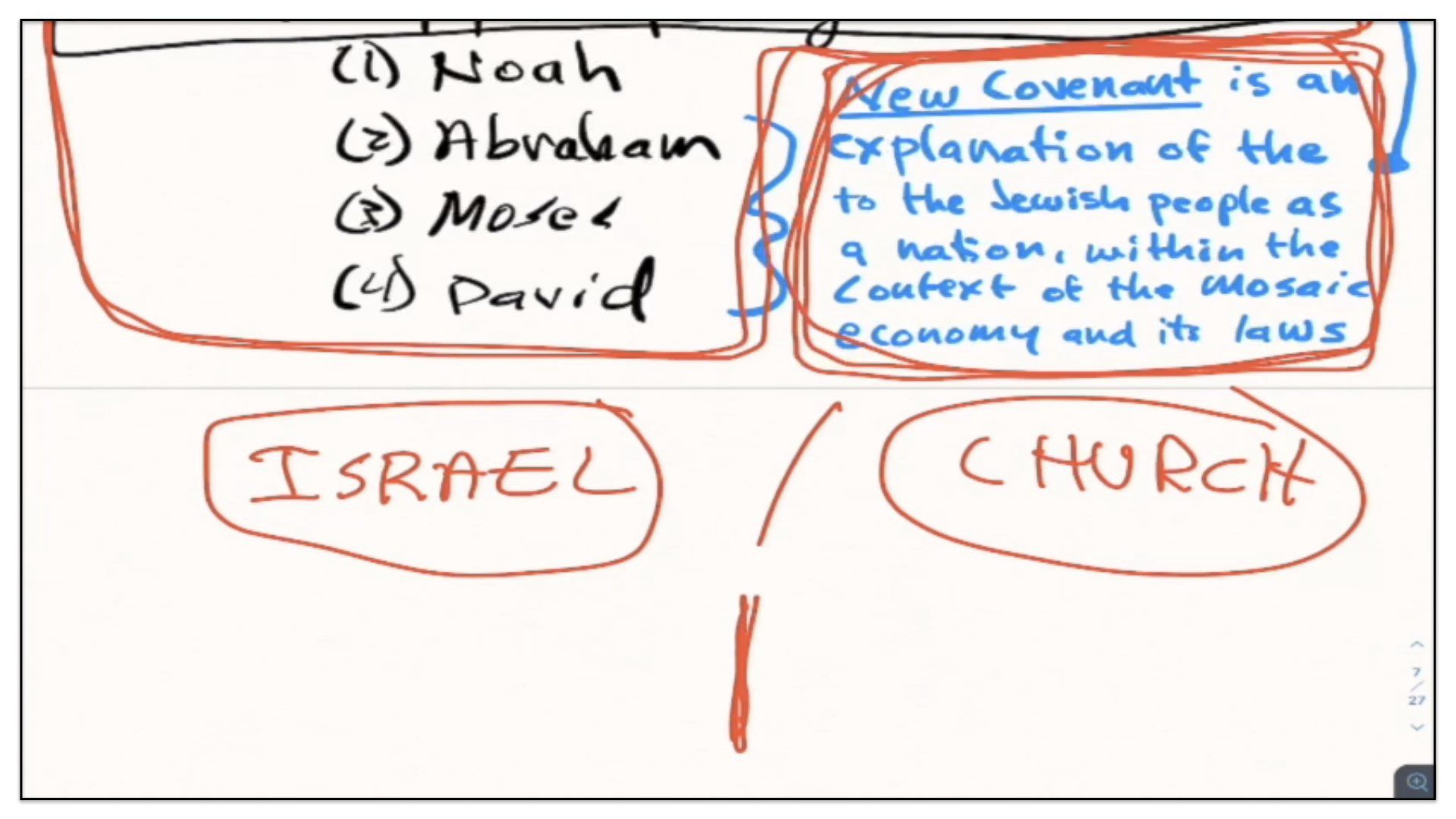
And then the week after, I would like to bring a special teaching on the distinction between Israel and the church. Now, those who lean towards something called Dispensationalism have very strong views on this topic. And those who lean the other direction, the Covenantalists, often go by the name Reformed, they also have very definite views on the subject. Well listen, my views on the subject differ from both of those groups. I would say I share some of the views of the Dispensationalists, but by no means all of them. And I also share some of the views of the Covenantalists, but again by no means all of them. I take a much different view than both of those groups and I would like to present to you my understanding of the distinction between Israel and the church and I’ll do that in a couple of weeks time, at which point this whole series on the biblical covenants will be concluded. And I’m looking forward then to returning to some more formal notes for the on-screen teachings and we’ll be looking once again at the books of the Bible and we’ll be, we’ll be picking up in the Old Testament and I’ll be bringing dedicated studies on giving you an overview for each book of the Bible, which I hope you’ll enjoy returning back to that study and reading each of those books during those week periods of our study.
Okay, well having said all of that I want to wish upon you as always the Lord’s blessings in the coming week, and I’m looking forward to meeting with you again next time.
Jared Smith served twenty years as pastor of a Strict and Particular Baptist church in Kensington (London, England). He now serves as an Evangelist in the Philippines, preaching the gospel, organizing churches and training gospel preachers.
Jared Smith's Online Worship Services
Jared Smith's Sermons
Jared Smith on the Gospel Message
Jared Smith on the Biblical Covenants
Jared Smith on 18th Century Covenant Theology (Hyper-Calvinism)
Jared Smith on the Gospel Law
Jared Smith on Bible Doctrine
Jared Smith on Bible Reading
Jared Smith's Hymn Studies
Jared Smith on Eldership
Jared Smith's Studies In Genesis
Jared Smith's Studies in Romans
Jared Smith on Various Issues
Jared Smith, Covenant Baptist Church, Philippines
Jared Smith's Maternal Ancestry (Complete)




